2021 A Year of Endurance

Letter from the President: A TIME OF


Letter from the President: A TIME OF
COVID-19 continued to command its place at the forefront of daily life during 2021, and Rowan-Cabarrus Community College continued to deliver a safe and successful educational experience throughout the year. Although the pandemic factored into every decision, our mission never wavered, and our years of commitment to excellence in online teaching and student support prepared us to navigate forward confidently and successfully.
Although masks and social distancing remained standard during 2021, we monitored COVID-19 cases closely as the year progressed and transitioned selected classes and services back to campus as soon as it was safe to do so. Whether on campus or online, we moved forward with initiatives to enhance and expand the opportunities available to our students and community.
The federal Higher Education Emergency Relief Funds (HEERF) allowed the College to support students through the pandemic and in 2021, the College awarded over $2.8 million to directly assist 6,784 students. This funding, combined with local and private funding, allowed the College not to lose a single student who enrolled during the summer and fall semesters. The federal funding also supported many health and safety protocols including campus upgrades to improve air quality, windows and UV-C sanitation installation in many buildings.
The Advanced Technology Center in Kannapolis was bustling with activity as the College announced two new corporate training partnerships in June 2021. Okuma America, a world-leading builder of CNC machine tools and systems, and RJG Inc., a recognized international leader in injection molding technology, have located training centers at the ATC, bringing to life the vision of the state-of-the-art building as a hub for national and international industrial training and innovation. As always, it was the support of community partners and generous supporters that made it possible to bring these projects full circle.
The College also continued its active partnership with the Rowan Education Collaborative, a first-of-itskind, innovative community initiative which brings together government and education leaders from across Rowan County to work toward the common goal of increasing local educational attainment and job opportunities.
Despite the challenges our community and world faced due to COVID-19, one thing remained constant during 2021 and will remain constant going forward: Rowan-Cabarrus Community College is and will always be a beacon of hope for our students. We offer opportunity for those who are re-envisioning their futures, and we continue to strategically partner with our community’s leaders as we prepare for the economic development of our region.
Rowan-Cabarrus stands ready to meet changing needs and give our students access to education and programs geared to the jobs of today and tomorrow. The degrees, diplomas, certificates and job skills earned here are relevant, credible and lead to high-tech, high wage careers with sustainable futures.
As we reflected on 2021 and prepared this annual report to share some of our highest priority initiatives with the community, it was evident that 2021 was truly “A Year of Endurance.” The Merriam-Webster dictionary defines endurance as “the ability to withstand hardship or adversity,” and the accomplishments of our institution showcased the resilience, compassion and strength of our faculty, staff and students.
While this year’s report is not a comprehensive list of the College’s accomplishments, you’ll find that these stories reflect the dedication shown by our leadership team, faculty and staff. These efforts resulted in
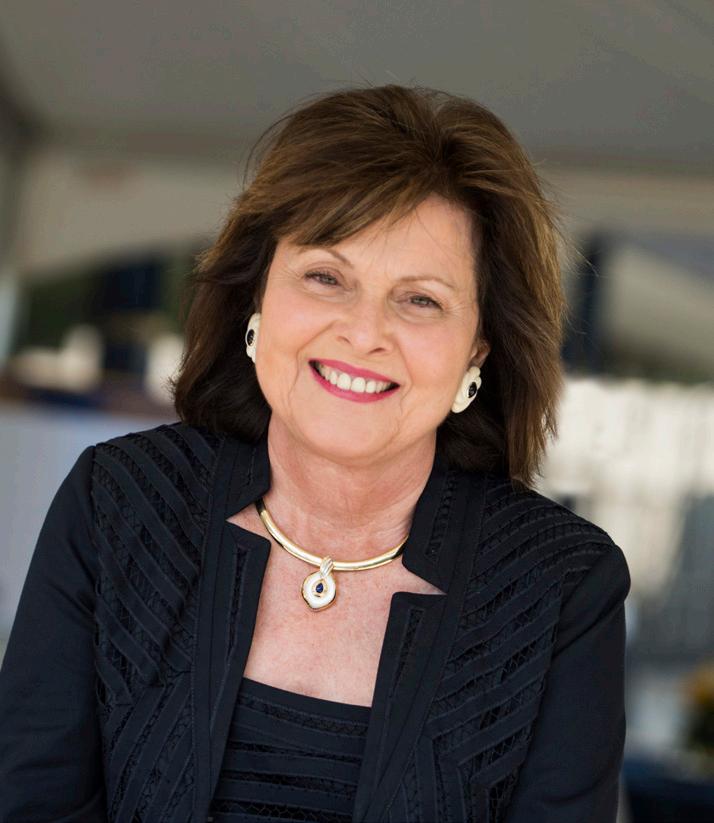
our ability to meet students right where they are – whether in a virtual advising session, a drive-through open house or on-campus in our healthcare clinical simulation labs. We are proud to serve as our region’s trusted workforce development provider, and we’ll continue to strive to be the first choice in higher education in our region.
Thank you for your continued support and commitment to Rowan-Cabarrus Community College. We depend on you to accomplish the important work that leads to better lives for our students and their families.
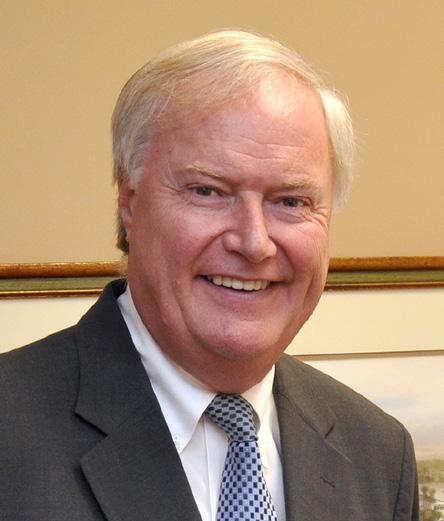


Rowan-Cabarrus Community College proves itself each year as an institution that impacts the region by driving the success of businesses, municipalities and individuals. Indeed, its importance increases each year as it carries out its mission of helping people improve their lives through education.
Amid the second year of a pandemic that brought unprecedented changes in the community and across the globe, Rowan-Cabarrus continued to lead with innovation and hope for a better tomorrow. As many people in the region lost jobs or sought new careers, the College offered new opportunities in high-demand fields. For students who were starting or continuing college to pursue a bachelor’s degree, Rowan-Cabarrus provided affordable, uninterrupted online learning, technology assistance for those who needed it, and increased partnerships with four-year institutions in the state to welcome its graduates with seamless transfer of credits and other benefits such as guaranteed admission and tuition discounts.
Already a trusted and dynamic community partner, Rowan-Cabarrus continues to lead the charge when it comes to strategic initiatives that drive the area’s economic and workforce development. The Advanced Technology Center in Kannapolis is bustling with activity, welcoming major corporate partners who have chosen the center as a national and international training site for employees.
From extraordinary leadership to dedicated faculty, staff and administration, the College is a collective force that serves as a catalyst to propel Rowan and Cabarrus counties forward. Rather than shy away from the constant changes and challenges that COVID-19 brought, Rowan-Cabarrus continued to find new and innovative ways to meet the needs of its students, the community and industry.
I am proud to be able to work with my fellow Trustees and the dedicated leadership team at RowanCabarrus as the College continues to help shape the future of our community. With a world that is ever-changing and a business environment that is increasingly competitive, Rowan-Cabarrus is one of our region’s most important resources, working daily to make higher education and a sustainable future accessible to all.
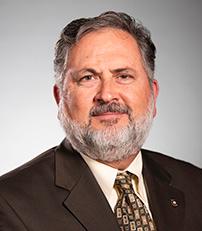
The Rowan-Cabarrus Community College Foundation activated and evolved many support mechanisms to ensure that our faculty, staff and students were supported throughout the pandemic. While COVID-19 brought unprecedented times, it also brought unprecedented needs and unprecedented generosity from those who believe in the promise of the College’s mission.
More than ever, students needed financial support with tuition, technology and emergency needs, and faculty and staff needed funding to implement innovative programming. The Rowan-Cabarrus Foundation stood at the ready, poised to support our students and institution and ultimately, continue to fulfill its ambition to support the highest priorities of the institution.
The Foundation focused on high priority projects to support student and community needs during 2021. As clinical sites shut down during the COVID-19 pandemic, healthcare students in the College’s health sciences programs, such as nursing and radiography, were faced with unprecedented challenges to ensure that students had the necessary required clinical hours to graduate. In order to meet this need, the Foundation purchased additional simulation manikins and equipment for students in these programs to attain required hands-on experience in the classroom to ensure they could stay on track for graduation and, ultimately, enter the healthcare field in a time when our community needed them the most.
Thanks to the abundant generosity of Fred and Alice Stanback, the College continued its solar project on our North Campus, including the installation of solar panels on three additional rooftops. This innovative public-private partnership will result in energy sales that will be utilized annually to fund student scholarships and professional development for faculty and staff.
As we navigate forward, the mission of Rowan-Cabarrus Community College is more important and relevant than ever. Rowan-Cabarrus has a commitment to our citizens to anticipate and meet their needs and contribute to a thriving community.
Together, we faced extraordinary challenges with innovation thanks to your generosity. Thank you for your confidence in the work of Rowan-Cabarrus Community College.
We make every investment count.
• Rowan-Cabarrus is the eighth largest in enrollment among the 58 North Carolina community colleges.
• Fifty-three percent of our students are female, 47 percent are male, 43 percent are under 25 and 39 percent are minorities.
• Approximately 47 percent of Rowan-Cabarrus students are enrolled in Corporate and Continuing Education classes.
• Rowan-Cabarrus employs nearly 389 full-time faculty and staff members, as well as over 524 part-time faculty and staff.
FACULTY TO STUDENT RATIO
16:1

55 DEGREES 36 DIPLOMAS 101 CERTIFICATES ROWAN-CABARRUS OFFERS
77%
COURSES OFFERED ONLINE
19,000NEARLY STUDENTS ANNUALLY
As the COVID-19 crisis continued, the College relied on its “Stay Well, Stay Connected” plan to protect students, faculty and staff while still ensuring that students were able to continue their studies and meet their academic and career goals. The plan specified the College’s broad efforts to keep the campus community safe, from enhanced disinfecting of facilities to conducting the majority of course instruction online.
Most student support and instruction continued to be delivered virtually throughout 2020 and 2021, except for limited student support services and classes such as public safety and healthcare that required inperson training and labs.

“As an institution, we felt responsible for exercising an abundance of caution, and our mission to continue educating our students and support them in every way possible never wavered,” said Dr. Carol S. Spalding, president.
Rowan-Cabarrus remained committed to extraordinary student support during this difficult time and was able to secure federal and state funding to make sure students could stay on track. Emergency assistance grants helped students with bills, transportation, childcare and many other needs. Through the College’s COVID-19 assistance form, students were able to reach out for support, regardless of the type of need.
The College relied on science and data-driven decision making to keep the campus as safe and healthy as possible. The College’s leadership team closely monitored local and state COVID-19 case numbers during 2020 and 2021, revising on-campus protocols accordingly. By May 2021, the required health screening of all individuals upon arriving on campus was discontinued, and more activities were conducted on campus, with the continued requirement of appropriate face masks and social distancing.
The pandemic propelled the College ten years into the future with regards to technology access and more flexible course offerings. As the College reconfigured its student support models to ensure that students
could be successful, programs were implemented that will alter the course of how students are served forever.
As a result of COVID-19, we built programs from the ground up to ensure students could thrive in a flexible and virtual learning environment. As a top ten digital community college, Rowan-Cabarrus was wellprepared to teach credible and meaningful courses virtually with Quality Matters certified online faculty. The pandemic allowed the College to focus on the next layer of vexing challenges facing our students. As a result of these focused efforts, and the federal HEERF funds and private funds from the Rowan-Cabarrus Foundation, the College was able to elevate its support services for students by developing new programs such as a laptop and wifi loaner program to help provide the necessary tools for students to succeed.
“The College’s faculty, staff and leadership team stopped at nothing to ensure that our students could succeed,” said Dr. Carol S. Spalding, president of Rowan-Cabarrus. “Any time we are in a position to help, we will help.”
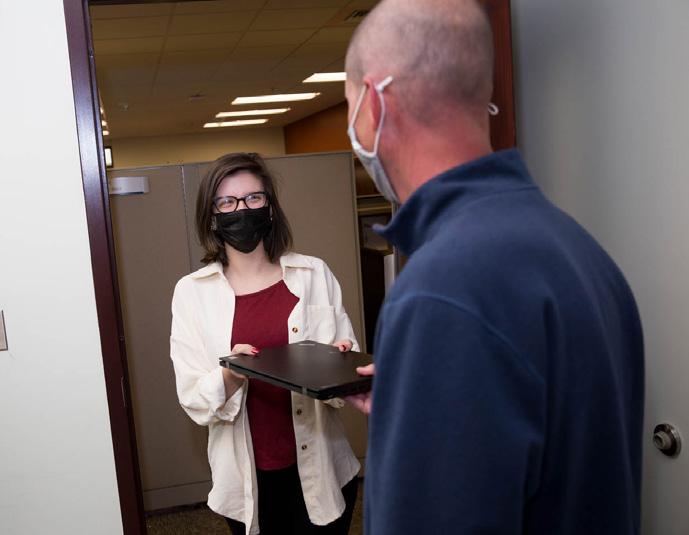
Throughout 2021, Rowan-Cabarrus continued its holistic support services, from wellness services to assistance with access to technology and opportunities for online student engagement outside of course requirements.
The Rowan-Cabarrus Wellness Center provides professional counseling and other support in the areas of academic, crisis, and food and daily necessities. Trained counselors and staff members assist students with any need to promote growth and success, and these services became more important than ever for students struggling with a variety of challenges during the pandemic. From access to food to mental health services, time management and stress relief techniques, the work of the Wellness Center was critical during COVID-19.
When COVID-19 prevented students from participating in the usual variety of extracurricular clubs and activities, the Rowan-Cabarrus Student Life team sprang into action with virtual events to ensure plenty of opportunities to stay engaged and informed.
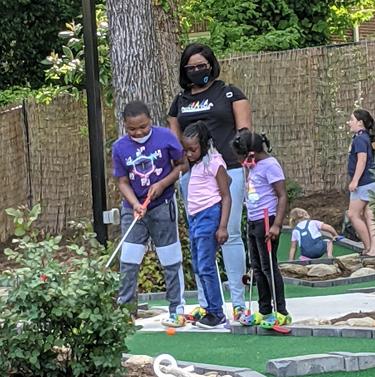
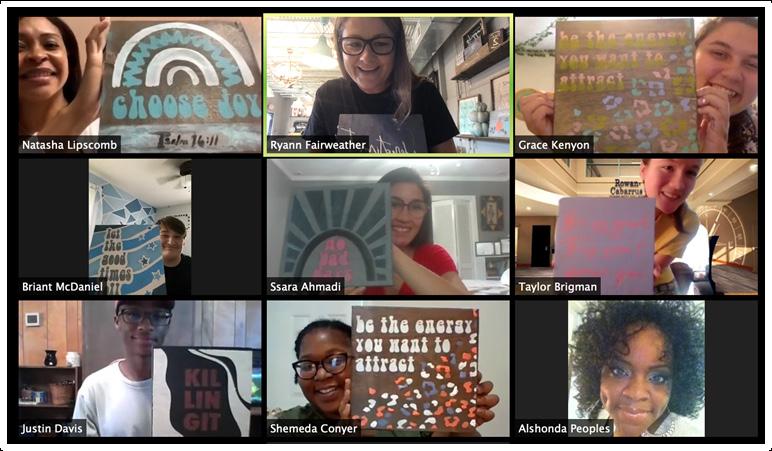
Student Life programming ranged from a “Get Your Laugh On!” comedy show to e-sports online gaming tournaments, financial wellness webinars, online competitions such as scavenger hunts and regular Instagram Live events.
The Student Government Association remained active during the pandemic, logging more than 2,000 hours of community service volunteering at the local hospitals and veteran’s hospital, COVID-19 vaccination centers, Rowan Helping Ministries, Trinity Living Center and Trinity Oaks, as well as participating in
One of Rowan-Cabarrus Community College’s top priorities is ensuring that students have access to the technology they need to complete their education. The Rowan-Cabarrus Foundation received a Retention Through Technology grant in 2019 from The Blanche and Julian Robertson Family Foundation, providing the funding needed to offer laptop computers to qualifying low-income students who live in Rowan County. As students persisted to complete their studies online during COVID-19, the need for access to technology increased, and additional funding allowed the College to continue providing laptops to students in both Cabarrus and Rowan counties.
“The high cost of digital devices and course materials was a barrier to success for many students before the arrival of COVID-19, so we were already working to bridge this ‘digital divide,’” said Ken Ingle, chief information officer at Rowan-Cabarrus. “Statistics show that students may skip or put off taking a class if they lack access to the digital tools they need. Particularly during the pandemic, it was important for the College to take initiative to make sure that didn’t happen.”
Operation Christmas Child and law enforcement and emergency services appreciation events.Rowan-Cabarrus honored its “COVID-19 Heroes” during an outdoor convocation event held with all employees in August 2021 at Atrium Health Ballpark, thanking faculty and staff members for their diligence in keeping the College’s five campuses safe during the pandemic.
“COVID challenged our staff and our students, but we have proven how resilient we are as an institution and as a community,” said Dr. Carol S. Spalding, president. “The definition of a ‘hero’ is a person of distinguished courage and ability, admired for his or her brave deeds and noble qualities, and our faculty and staff have been heroes for our students every day, supporting them in any way needed to foster their success.”
Three employees were honored with “Golden Thermometer Awards,” having received the most nominations from their peers for supporting the College.
Kim Barnett, executive assistant for the College’s events and logistics department, was honored for coordinating the health screening process at all five Rowan-Cabarrus campuses to ensure safety as faculty, staff and visitors arrived. Her work included managing employees and students who elected to help staff the screening shifts, mastering a new software management system, and dealing with many last-minute scheduling changes. “Kim worked daily to ensure that screening coverage on all campuses continually exceeded expectations, working well beyond her typical eight to five shift,” one nominator said.
Melissa Reid, instructor and mathematics department chair, was recognized for going the extra mile to ensure that students and faculty felt supported. She provided training, videos and personal guidance as instructors transitioned to online teaching and helped introduce new technology and online tools to increase student achievement. “If there is a reallife superhero, it would be Melissa Reid,” wrote a nominator. “She deserves so much recognition for her selfless leadership throughout the pandemic.”
Rowan-Cabarrus Executive Director of Adult Education and Literacy Jay Taylor received the most
nominations from across the College for assisting others during the pandemic. He provided deer meat from his own freezer to others when there was a nationwide meat shortage and personally delivered toilet tissue and gasoline to those in need when availability continued to pose issues. At the campus health screening tent, he volunteered for the early morning shift with a smile and a word of encouragement, often bringing doughnuts for his fellow screeners. “In his true style, day in and day out, regardless of temperatures or inclement weather, he was dedicated and committed to keeping the campuses safe,” one nominator wrote of Taylor. “The world would be a better place if we had more people like him,” another added.
The following employees also were nominated individually by co-workers for their efforts to assist students and the College: Alan Thompson, Allison Scott, Barb Collins, Brenda Mauldin, Carl Ritchie, Caroll Hodgson, Carter Wingfield, Chad Nichols, Dr. Michael Quillen, Dusty Saine, Faith Jelley, Gary Anderson, Jon Crockett, Judy Lee, Katie Herring, Kelly McCowan, Ken Ingle, Laurie Robb, Mandy Thacker, Misty Moler, Nekita Eubanks, Roberta Mahatha, Sherry Strawn, Terri McKnight and Zhivi Williams.
Groups and departments nominated included the College’s Navigation Station staff at North and South Campus, Career and Academic Advising, the Continuing Education Division and Training Services Team, the English Department, Occupational Therapy Assistant faculty, Enrollment and Recruiting, the Testing Center, Student Success Services, the Student COVID Support Team, and Rowan-Cabarrus faculty. President Carol Spalding and the Board of Trustees also received nominations.
“As a College, we pivoted successfully from faceto-face instruction to virtual because we were already largely prepared and trained,” Spalding said. “Whether employees were screening campus visitors in the pouring rain or freezing cold, moving course content online, disinfecting our spaces and reconfiguring classrooms to ensure social distancing, or serving our students by assisting them with financial aid, academic advising, counseling, technology and more, they are all heroes.”
ore than 730 graduates received associate degrees, diplomas and certificates at RowanCabarrus Community College’s May 2021 graduation. The ceremony, held at Charlotte Motor Speedway, honored students from the Spring and Summer 2021 academic terms.
Due to COVID-19, ceremonies were held in a drivethrough format that allowed graduates to circle the track to receive their diplomas from President Carol Spalding and, quite literally, cross the finish line.
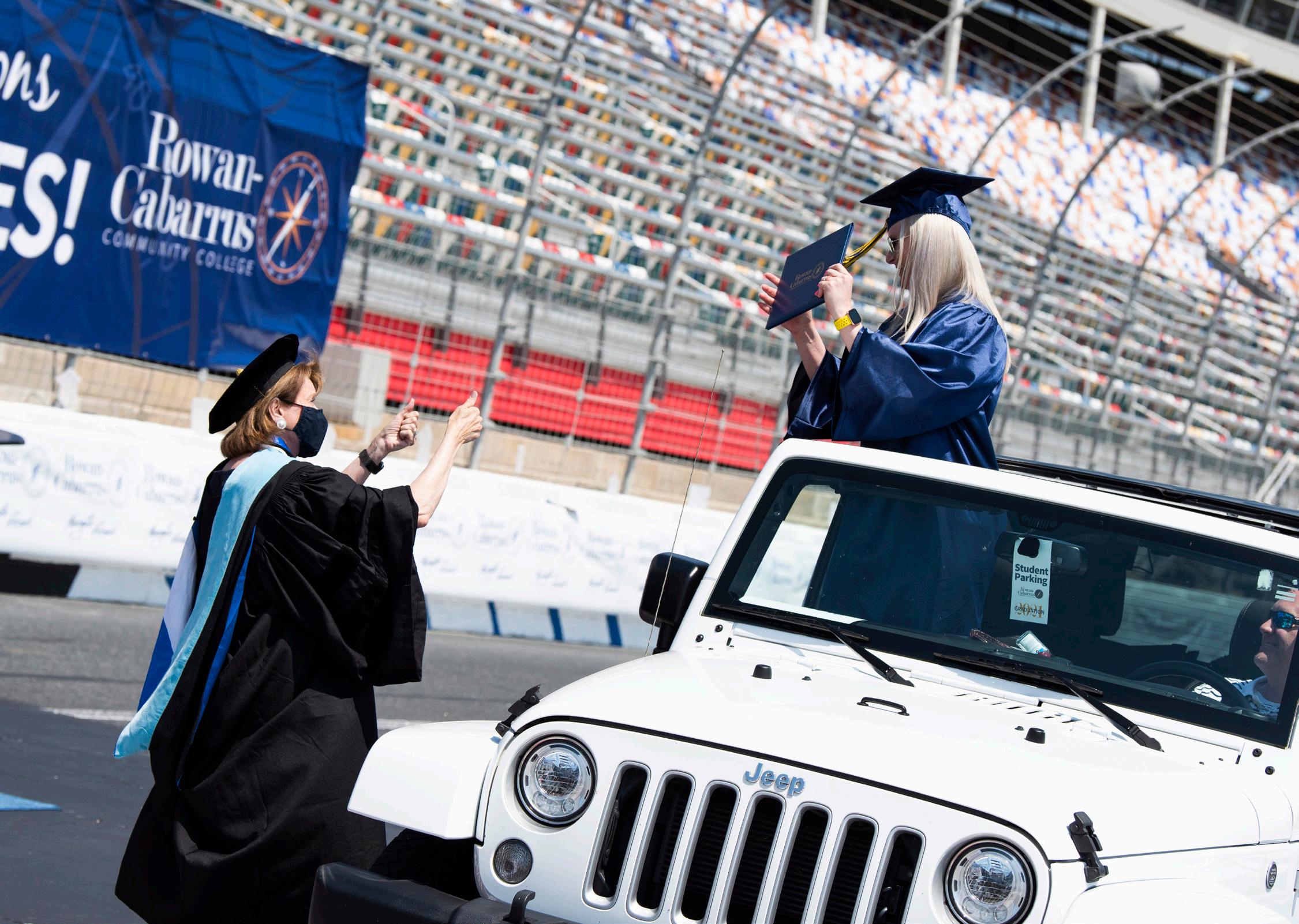
“While graduation celebrations looked different in the midst of the pandemic, we were excited to welcome graduates to the Charlotte Motor Speedway for an event that created memories for a lifetime,” Dr. Spalding said. “COVID-19 may have changed our plans, but it did nothing to diminish the accomplishments of our graduates, and it was important to us to give them an experience to remember.”
Commencement speakers were Dr. Darise “Dari” Caldwell, former president of the Novant Health
Rowan Regional Medical Center and a member of the Rowan-Cabarrus Board of Trustees, and Damola Ogunyomi, vice president of the Student Government Association and a member of the Class of 2021.
“As you move forward in life, I hope that you will always continue to learn and be open to the endless possibilities life holds,” Dr. Caldwell told the graduates. “If you continue to learn, you may be surprised where life takes you.”
Ogunyomi encouraged her fellow classmates to navigate through low points in life with a positive attitude. “No matter what you’re going through, you are not stuck there. You are capable of working hard, moving forward, and reaching your goals,” she said. Growing up in Nigeria with hardships including inconsistent electricity and a lack of drinkable water, Ogunyomi knew her way out was through education, a privilege many did not have. She credits the family atmosphere at Rowan-Cabarrus for becoming the “home away from home” that helped her achieve her dreams.
Ogunyomi, a graduate from the Associate Degree Nursing program, was selected as a Student Excellence Award finalist both years and was the College’s nominee for the statewide Governor Robert W. Scott Student Leadership Award. “We are capable of more than we think,” she said. “Our small actions can bring about great positive change. We are the leaders of tomorrow – leaders who can inspire others.”
During the drive-through graduation, students wore their caps, gowns and honorary regalia and had friends and family join them in their cars for the procession. Graduates and their guests tuned their FM radio to hear the ceremony in their cars, and congratulatory speeches and other elements of the ceremony were projected on the speedway’s jumbotron video screen. Additional friends and family were able to join the celebration virtually, via a live stream on the internet.
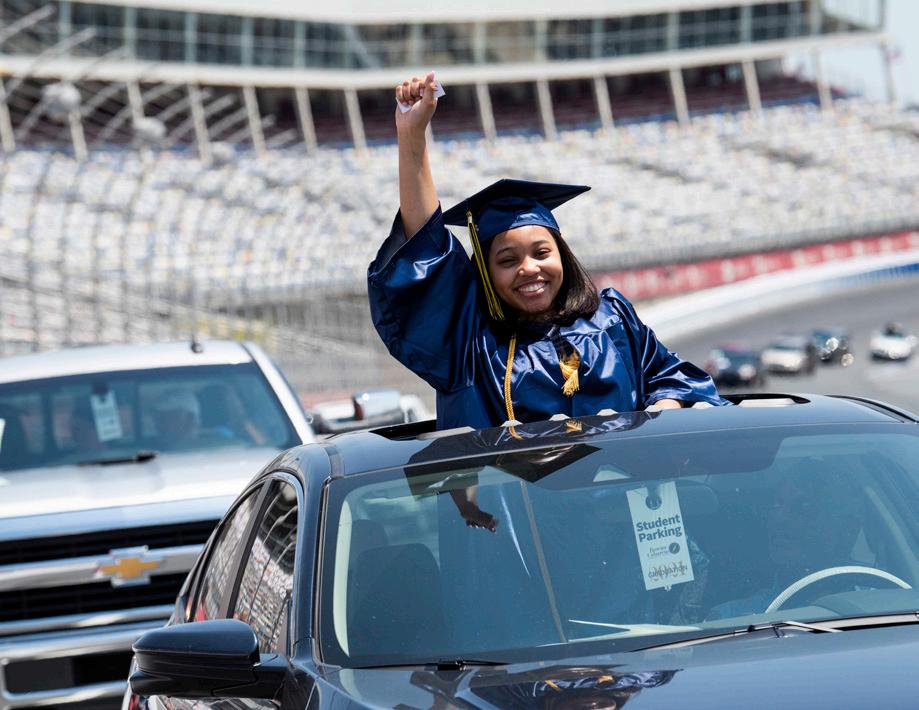
“Throughout the pandemic, the Class of 2021 remained dedicated to their educational and career goals without wavering,” Dr. Spalding said. “They exhibited incredible resilience in the face of difficult circumstances, and I wish them the greatest success as they continue to navigate forward.”

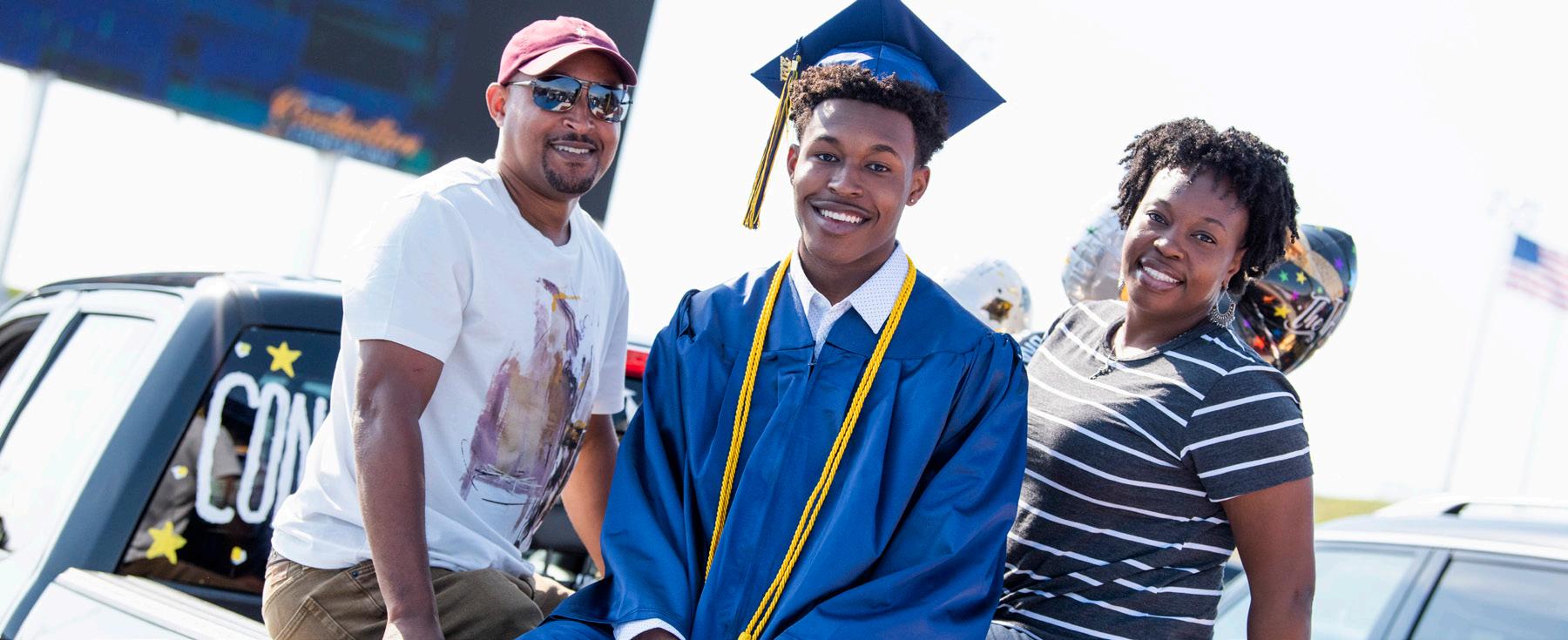

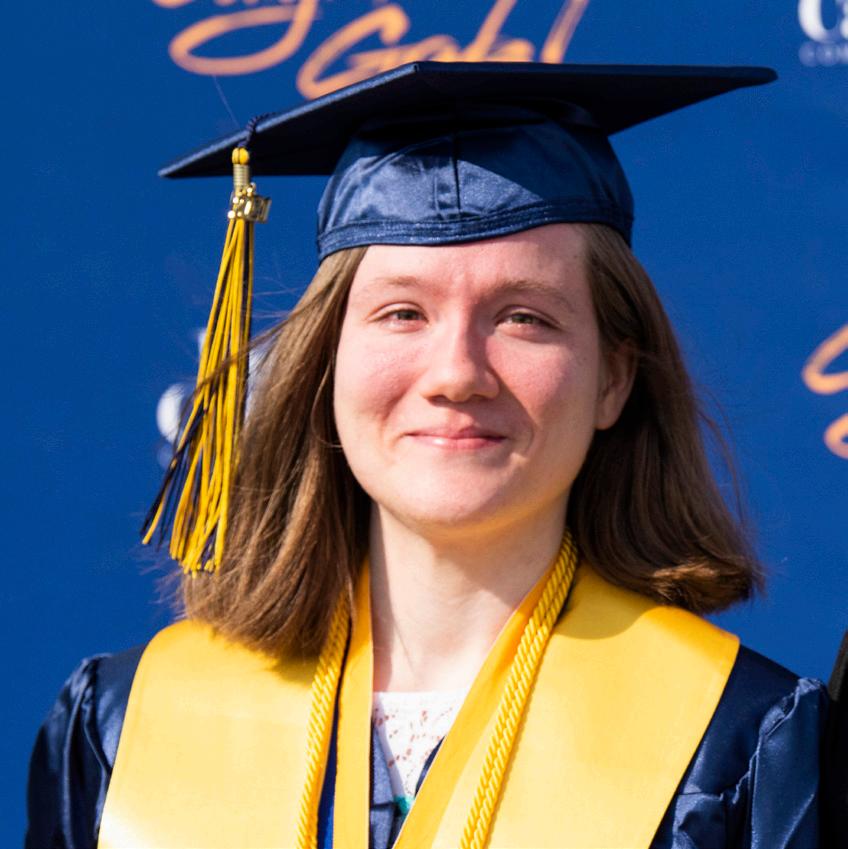
“The Class of 2021 faced more obstacles than we ever expected, but we persevered, and I believe we have emerged stronger than ever and ready to take on anything that comes our way.”
– Taylor Brigman 2020-2021 Student Government Association President & Classof 2021 Graduate
Technology Center (ATC) at the North Carolina Research Campus in 2019 added a dynamic asset to the region’s workforce development efforts. The cutting-edge facility houses the College’s programs to train students for in-demand careers in fields such as mechatronics, robotics and engineering and is now the site of two major corporate partnerships announced during 2021.
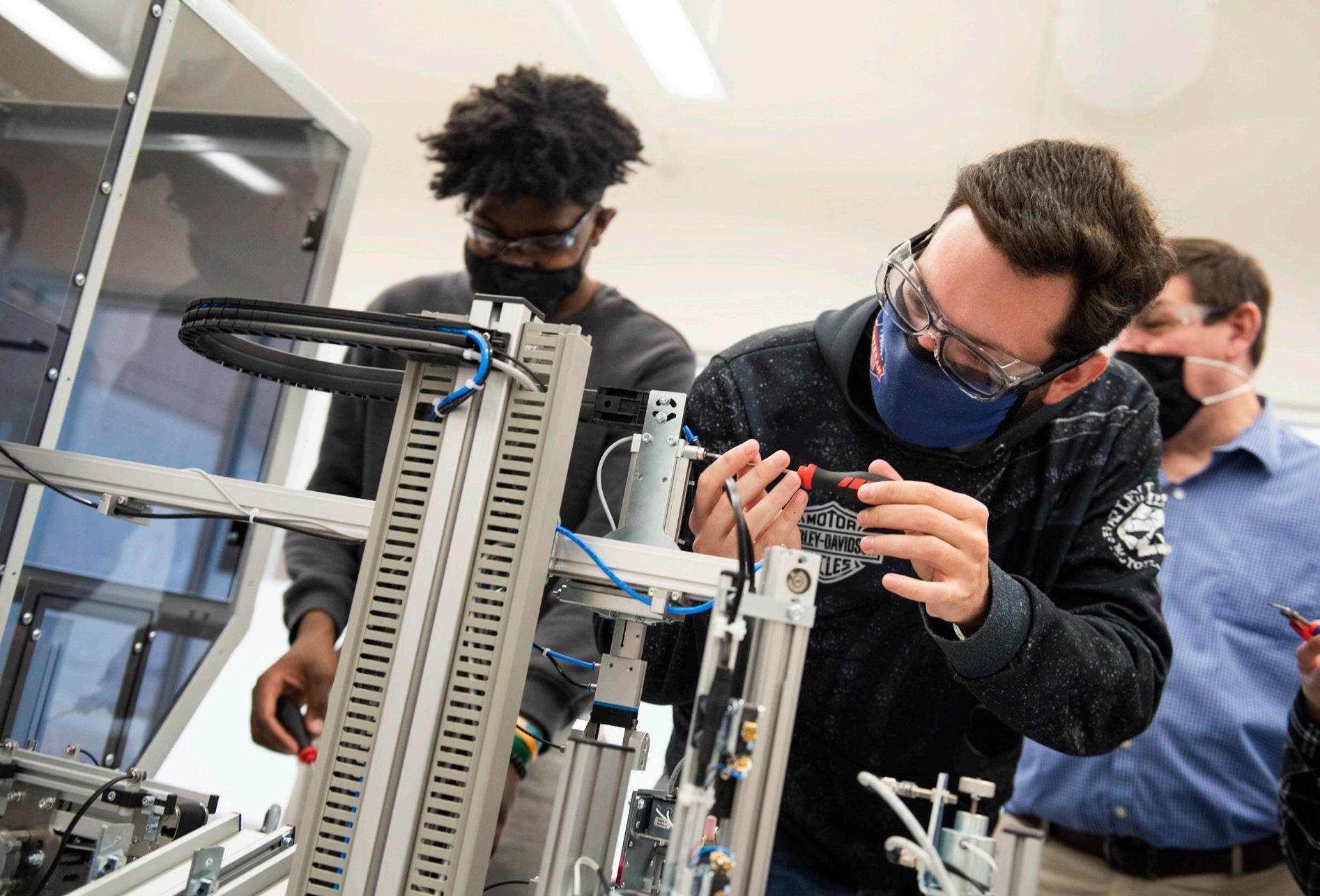
Okuma America Corporation, a world-leading builder of CNC machine tools, controls and automation systems, and RJG Inc., a recognized international leader in injection molding training, consulting and technology, both operate corporate training centers in the state-of-the-art building.
RJG Inc. uses a fully operational lab and classroom space at the Advanced Technology Center to offer injection molding certification and advanced composite training. The training center prepares students for jobs in the advanced materials manufacturing industry, including positions as fabricators, machine operators, technicians, molding line operators and more. RJG has more than 100
training centers worldwide.
The Okuma-Rowan-Cabarrus partnership provides technical training to Okuma customers, distributors and employees at the Okuma Machine Tool Academy (OMTA) located within the ATC. The Okuma Machine Tool Academy houses several of the company’s flagship products, including an Okuma LB3000 EX II horizontal lathe and an Okuma GENOS M460V-5AX five-axis vertical machining center. Courses are offered in three focus areas: electrical maintenance, mechanical maintenance and programming and operations. The program brings in corporate trainees from across the globe.
The Advanced Technology Center houses adaptable laboratory and classroom space designed with an eye toward allowing the College to continue to anticipate and respond to technology changes and industry growth for the next 50 years. A large flex lab on the ground floor provides space for industry partners including Okuma and RJG to collaborate and innovate alongside the College.

The facility focuses on training in high-tech fields such as mechatronics, engineering technologies, robotics, motors, computer-aided design, 3D printing, hydraulics and pneumatics. Students work on equipment that companies currently use in the workplace, gaining valuable hands-on experience.
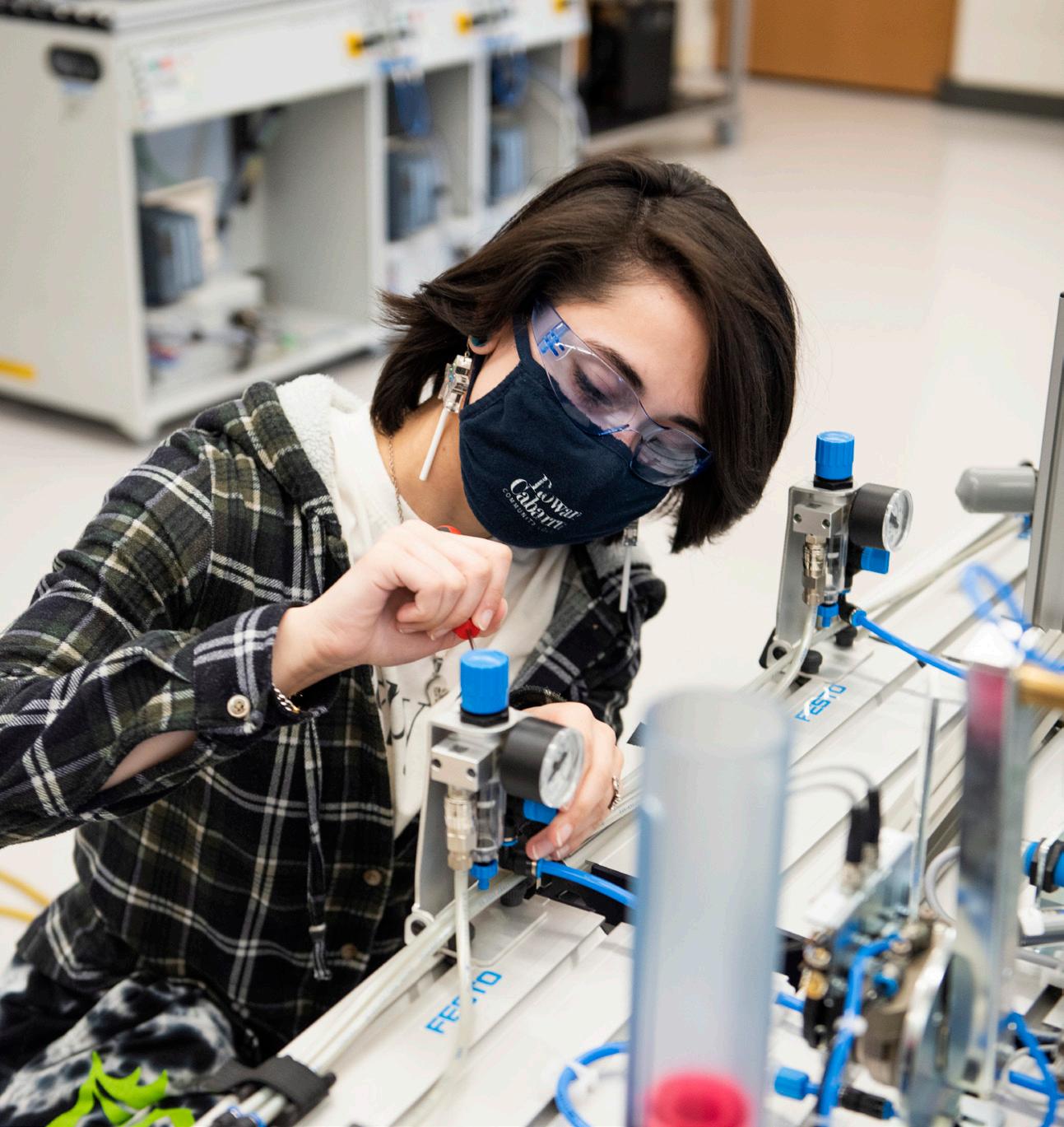
“With the Advanced Technology Center, RowanCabarrus Community College has created a flagship to help attract employers to our area,” said Steve Morris, chair of the Cabarrus County Board of Commissioners and a member of the Rowan-Cabarrus Board of Trustees. “These partnerships are just the beginning of a strong and bright future for the entire region.”
The 53,000-square-foot building sits adjacent to the College’s biotechnology and nursing facility, on nearly three acres of land donated by David H. Murdock,
chairman, CEO and president of Castle & Cooke, Inc., and founder of the North Carolina Research Campus. The ATC exists thanks to Cabarrus County voters who passed a bond referendum in 2014 to support the facility, additional assistance from the Cabarrus County Board of Commissioners, a federal Economic Development Administration grant, and private funding raised through the Rowan-Cabarrus Foundation.
“The Advanced Technology Center is intended to be a hub to train workers for the jobs of tomorrow and help professionals develop top-notch skills to meet industry growth,” said Dr. Carol S. Spalding, president. “We are thrilled to see the flurry of activity there, bringing to life our vision of this facility as a game-changer in serving the needs of employers and driving workforce development.”
“We knew that Rowan-Cabarrus Community College would help promote economic development in Cabarrus County, but we didn’t know that it would be a leader that others could aspire to, serving as a flagship to help attract employers to the region. These partnerships are just the beginning of a strong and bright future for our region thanks to the Advanced Technology Center.”
– Steve Morris Chair of the Cabarrus County Commission & Member of the RowanCabarrus Board of TrusteesOf the 11 Rowan-Cabarrus students named as finalists for the College’s 2021-2022 Student Excellence Awards, two were chosen to compete at the state level, with a third selected as the Rowan-Cabarrus Academic Excellence winner. The finalists ascended to the top of a field of hundreds of applicants who were invited to submit essays for the awards.
Thaisala Eubanks is the College’s Governor Robert Scott Student Leadership Award nominee. Robert W. Scott served as N.C. State Governor and later as president of the North Carolina Community College System, and the award bearing his name honors students who demonstrate extraordinary leadership qualities. Eubanks had always wanted to attend college but, as a teenage mother, put her education on hold to raise a family. She is pursuing her degree at Rowan-Cabarrus with the goal of working in juvenile counseling and continuing to help her family operate their non-profit organization, which assists children and families who have been displaced from their homes and are living temporarily in hotels. Eubanks is a member of the Phi Theta Kappa Honor Society and the National Society of Leadership and Success, as well as the Rowan-Cabarrus President’s List.
Connor Kyles was honored as the Rowan-Cabarrus Academic Excellence Award winner. The award recognizes the academic achievement, leadership, and community service of a student from each of the 58 institutions in the North Carolina Community College System. After dropping out of a four-year institution on his first attempt and struggling with substance abuse and depression, Kyles is in recovery and helps others overcome the same struggles he faced. He now has a 4.0 grade point average at Rowan-Cabarrus as he pursues his degree.
Leonidas Lazo was chosen as the Rowan-Cabarrus Dallas Herring Achievement Award nominee. Dr. Herring, a North Carolina native, is acknowledged as the philosophical godfather of the state’s community college system for his belief that education should be available to all and that community colleges should “take people from where they are, to as far as they can go.” Lazo came to the United States at age 18
and taught himself English while working full-time so that he could pursue a degree in Construction Management Technology at Rowan-Cabarrus.
Other finalists were Justin Davis, Grace Dunn, Rodina Eliwa, Sabre Foster Furr, Tyler Jeffery, Chandra Johnson, Alshonda Peoples and Jasmine Rosenberry.
“We are extremely pleased to recognize these exceptional students and their impressive accomplishments,” said Dr. Carol S. Spalding, president. “As we learned about their life experiences, personal victories and goals for the future, we were inspired and proud of their achievement, leadership and perseverance.”
Representing Rowan-Cabarrus as the 2021 William D. Weston Outstanding Student of the Year for the North Carolina Work-Based Learning Association is Trent Phillips, marking the second time in three years that a Rowan-Cabarrus student has received this honor. To be eligible for the award, a student must be nominated by their college and employer, with details of their achievements and contributions to the program, company and community. Phillips is studying business administration with a concentration in marketing and retailing and interned with Urbane Environments Community Engagement Consultants, a consulting agency that helps shape public, private and municipal development plans.
“Trent Phillips is a great example of the heights students can achieve when they approach internships with the mindset to learn, develop and grow,” Dr. Spalding said. “Our Work-Based Learning program offers a unique opportunity for students to get realworld experience and begin to map out a successful future. We want to encourage our current and future students to engage in the program as part of their academic preparation.”

“The support the faculty and staff provided me throughout my work-based learning experience was critical to my success and I can’t speak highly enough of how much my internship and the support of the community college has meant to me.”



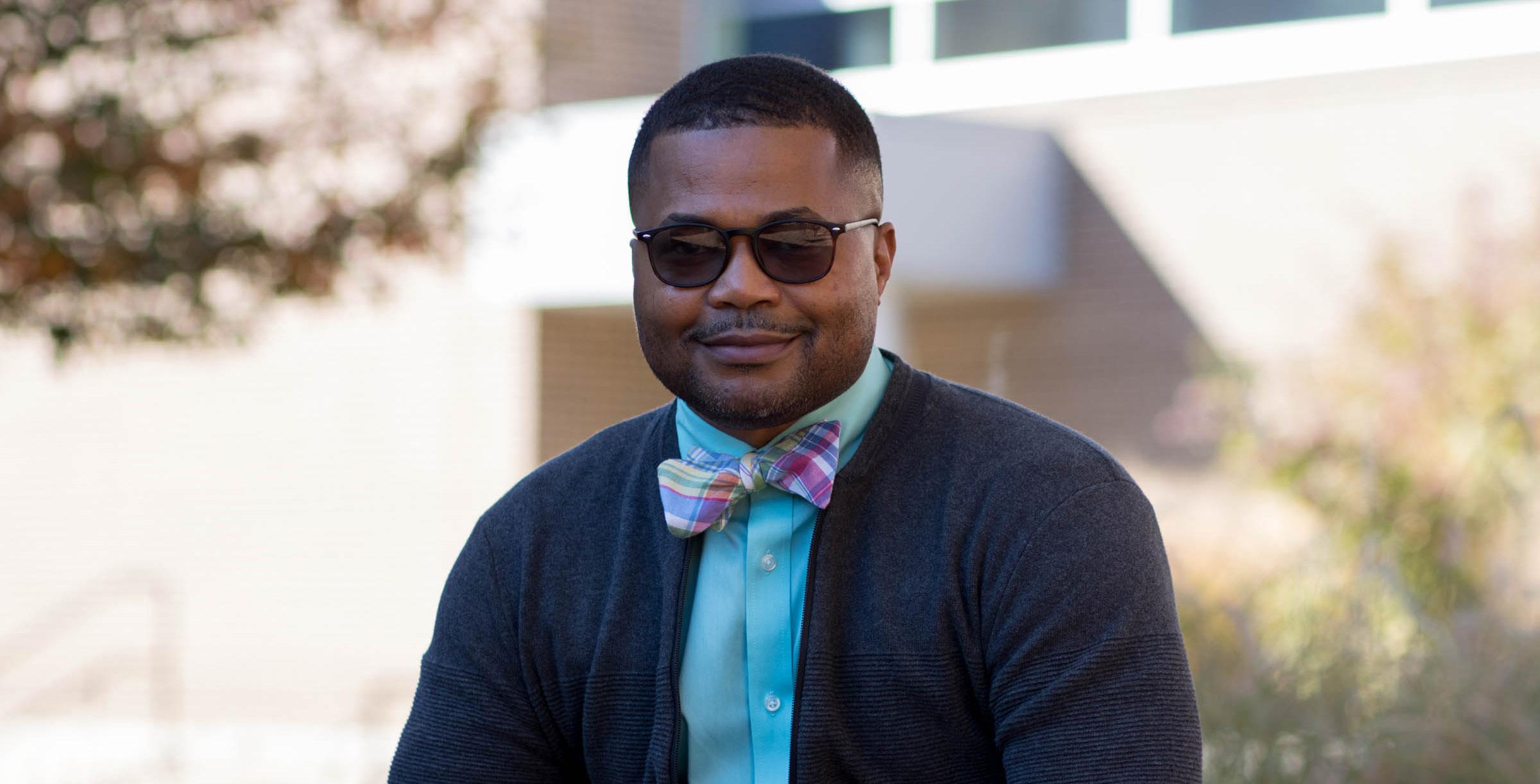 – Trent Phillips
Rowan-Cabarrus Student & 2021 William D. Weston Outstanding Student of the Year for the North Carolina Work-Based Learning Association
Thaisala Eubanks
Connor Kyles
Leonidas Lazo
– Trent Phillips
Rowan-Cabarrus Student & 2021 William D. Weston Outstanding Student of the Year for the North Carolina Work-Based Learning Association
Thaisala Eubanks
Connor Kyles
Leonidas Lazo
Rowan-Cabarrus Community College continues to be the top provider of fire and emergency services training in North Carolina. Undeterred from the challenges that the COVID-19 pandemic presented, the College continued to provide more opportunities for student success. The state of North Carolina did not relax training standards or certification requirements during the pandemic. To address these challenges, the College quicky moved into action by providing larger classroom spaces, expanding access to personal protective equipment and increasing the number of classes to allow for smaller class sizes.
The investments from the community and the College in public safety programs allow them to grow and provide state-of-the-art facilities for training. In March 2021, the College cut the ribbon on a new fire and emergency training tower to further provide a safe setting for fire and emergency personnel to learn and practice high-rise firefighting and rescue operations.
The tower provides opportunities for navigating and escaping from hazardous environments, increasing the chances of emergency personnel survival and the rescue of victims. The facility allows the simulation of scenarios for the instruction and practice of operations such as ladder maneuvers, high-angle and rappelling rescues, upper-floor and stairwell rescues and confined-space escapes.
“Rowan-Cabarrus is proud to educate many of our community’s heroes, and this cutting-edge facility is an example of our commitment to ensure that they are trained to be as safe and successful as possible on the job,” said Dr. Carol S. Spalding, president.
The tower, which covers just over 3,400 square feet and sits on approximately a half-acre of land, was funded with assistance from the 2016 Connect NC public improvement bond. With a total project cost
of $1,499,936, the training facility will have a lasting impact on local communities not only by ensuring top-notch public safety preparedness, but in terms of financial benefits such as lower insurance costs realized by optimal fire department response times and performance.
Additionally, with the passage of the 2020 bond referendum in Rowan County, a groundbreaking decontamination training facility is planned on North Campus to train firefighters in best practices to minimize the danger of long-term exposure to carcinogens and contaminants. This facility will focus on protecting firefighters from the dangers they face daily.
Rowan-Cabarrus Community College and RowanSalisbury Schools, Kannapolis City Schools and Mount Pleasant High School in Cabarrus County have formed a partnership to offer local high school seniors interested in a career as a firefighter to begin their training during the school day through the Rowan-Cabarrus Community College High School Fire Academy. The High School Fire Academy trains students to become N.C. certified firefighters and emergency medical responders. There is no cost to the student and all equipment is provided. Students also earn credit toward high school graduation while in the program.
“This is a win-win for local high school students and for the community,” said Salisbury Fire Chief Robert Parnell. “The community needs dedicated, well-trained public safety professionals, and RowanCabarrus Community College operates one of the largest and most well-known fire training programs in the state. For a student who has a competitive spirit and a will to serve, the Fire Academy offers an excellent chance to get a head start on a fulfilling career.”

The College was deeply saddened by the loss of Roger McDaniel, Director of Fire and Emergency Services, who passed away in October 2021. McDaniel spent more than 30 years as director of the fire and emergency services program at Rowan-Cabarrus Community College and was also chief of the ScotchIrish Fire Department for more than three decades.
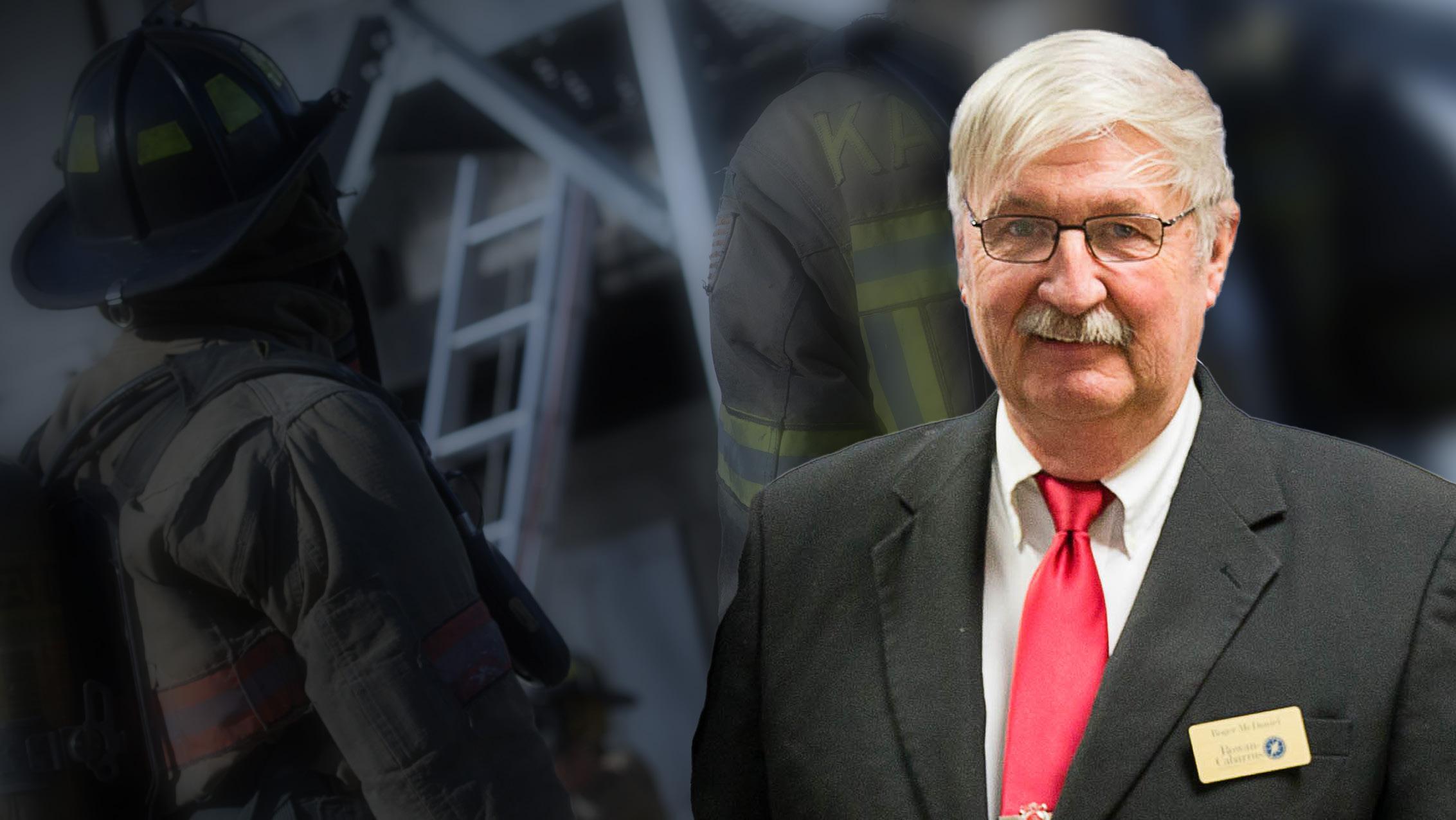
The memorial service, held by the Cabarrus County Fire Association and Rowan County Fire and Rescue Association, was held on the fire and emergency services training grounds at Rowan-Cabarrus Community College’s North Campus. The ceremony honored and remembered Roger’s service and drew friends and colleagues from the region and beyond to reflect on McDaniel’s life and legacy. The RowanCabarrus Firefighter Rookie Academy opened with the Presentation of Colors, and firetrucks surrounding the training ground area sounded a ceremonial siren salute to close the ceremony.
“Roger McDaniel’s presence will be greatly missed at the College and far beyond,” said Dr. Spalding.
“He made a lasting impact on so many lives, and this service was a meaningful way for those who cherished his friendship and leadership to remember his tremendous legacy.”
In addition to the outstanding facilities and training programs in fire and emergency services, the College offers training programs in basic law enforcement. As the programs continue to grow and expand, RowanCabarrus recently acquired approximately 25 acres of land across from the College’s South Campus, which has been upfitted as an additional law enforcement education facility.
Now called the Tactical Training Building, the building contains modular wall units that can be configured into various room designs to replicate the interior of a small house, hotel floor and school hallway. Instructors can change these modular wall layouts to minimize officer familiarity of the structure and increase unpredictability, leading to a better training environment.
“The Tactical Training Building is an important addition to our law enforcement training processes,” said Dr. Spalding. “These are some of the most important classes held at the College. We count on these professionals to protect our communities every day.”
“Firefighters often say, ‘Let no man’s ghost return to say his training let him down,’ and that phrase embodies the lifelong work of Roger McDaniel.”– Kevin Gordon President of the North Carolina Association of Fire Chiefs
The role of healthcare workers has been at the forefront during the COVID-19 pandemic, and Rowan-Cabarrus Community College continues to educate the next generation of professionals. The College’s healthcare programs – nursing, radiography, occupational therapy assisting, physical therapist assisting and dental assisting – are growing in popularity among students who are seeking top-notch training and excellent pass rates on national licensing exams. Students choose Rowan-Cabarrus for a direct route to relevant certificates, diplomas and degrees that allow them to join the workforce in a wide range of positions that are vital to the fabric of the community.
As more students than ever seek careers in healthcare, Rowan-Cabarrus anticipates the needs of the industry, adjusting enrollment and degree programs to meet workforce needs. By educating students with the latest equipment, the College prepares graduates for the jobs of today and tomorrow. State-of-the-art upgrades, such as the addition of a “C-arm” in the radiography lab in 2021, offer students the opportunity to gain handson experience with the same equipment used in hospitals and clinics. The C-arm, which provides real-time, moving X-ray images, is available to students thanks to a generous contribution from
The popular Associate Degree Nursing program provides a high-quality, two-year path for students seeking a career as a registered nurse and promotes the transition of the licensed practical nurse into the role of registered nurse. The Nurse Aide I and II programs teach fundamental skills required of health professionals and are a popular choice for students seeking a short-term path to employment in hospitals, long-term facilities, and home health agencies.
The College also offers an Associate in Applied Science degree in Healthcare Management Technology (HMT), designed to develop workforce-ready professionals for technology-based healthcare roles by focusing curriculum on areas such as electronic health records, medical billing, insurance, and financial management.
Rowan-Cabarrus healthcare students are top performers on required standardized credentialing exams, with all programs achieving 100% pass rates, and they enjoy abundant employment opportunities.
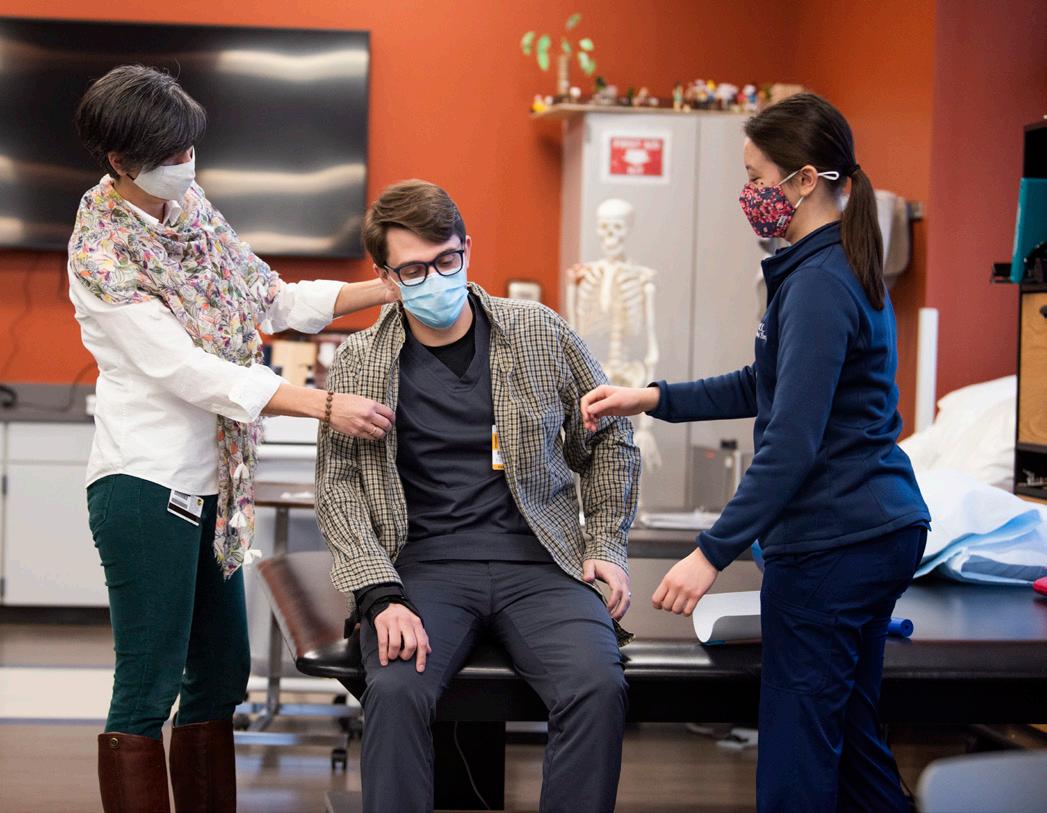
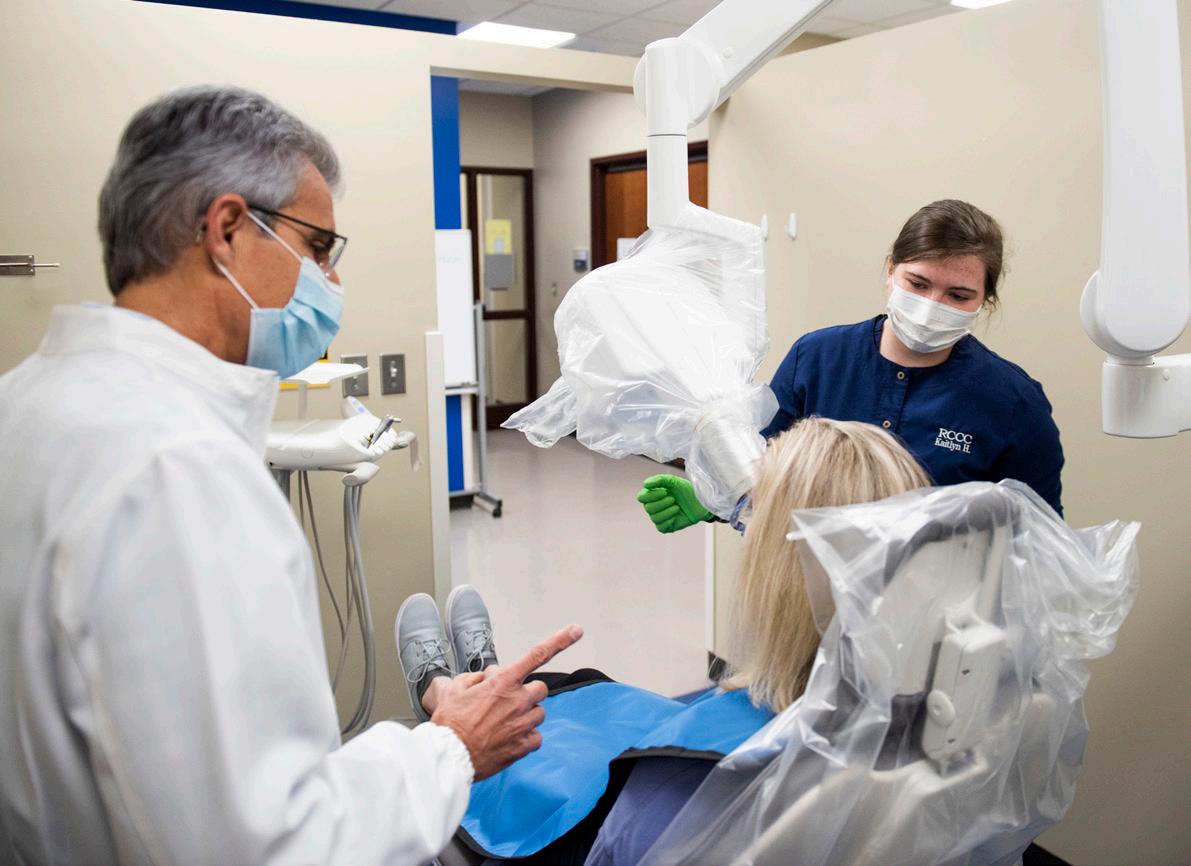 the Leon Levine Foundation to the Rowan-Cabarrus Foundation.
the Leon Levine Foundation to the Rowan-Cabarrus Foundation.
Not only do the College’s health occupations students benefit from high-quality instruction and state-of-the-art facilities, but they also give back by volunteering on campus and in the community to further their knowledge and help others.
Occupational therapy assistant students worked with campers at Wings of Eagles Ranch in Concord during the summer of 2021 as part of a clinical fieldwork rotation. The non-profit ranch’s camp serves children and teens with special needs, as well as typically developing campers, and students assisted with activities such as horseback riding, ziplining, canoeing, climbing, and arts and crafts.
The students were able to apply the information and skills learned in the classroom by assisting individuals with an array of disabilities.
“My favorite part was education and training in therapeutic horseback riding, as well as the high ropes,” said student Crystal McNeely. “Watching the children overcome obstacles that scared them, or they lacked confidence in, was very rewarding.”
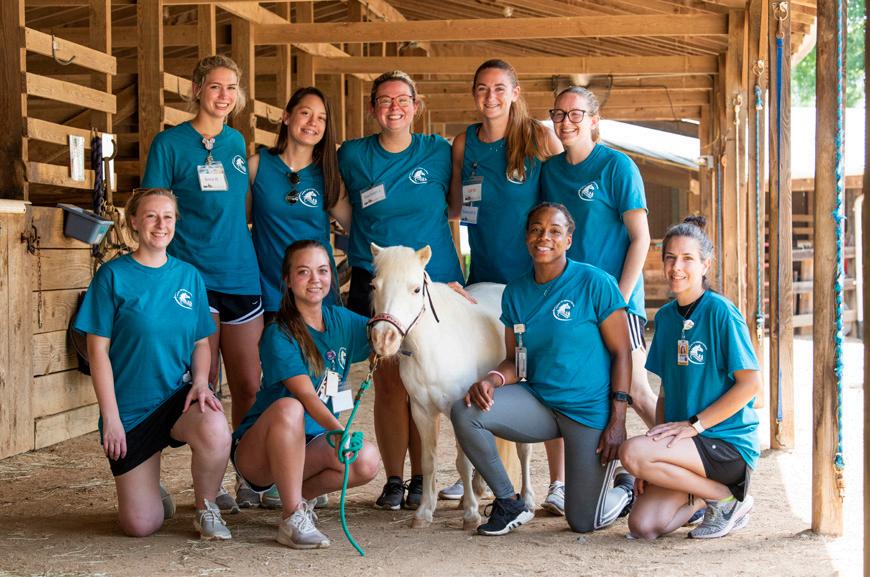
Nursing students and faculty volunteered time in the community to assist with local COVID-19 vaccination clinics through the Rowan County Health Department and Cabarrus Health Alliance. Nursing graduates were also on the front lines during the pandemic, some taking care of critically ill patients in hospital intensive care units.
Nursing graduate Holly Casper credited RowanCabarrus for helping prepare her not only with clinical skills, but with the critical thinking skills to navigate difficult situations as she tackled her first nursing job during the pandemic. “I feel like the changes we had to endure during our learning processes and the compassion our instructors showed helped us prepare for the unknown,” she said.
“The pandemic has affected everyone, and we are honored to be able to train compassionate healthcare professionals at Rowan-Cabarrus,” said Dr. Carol S. Spalding, president. “I am so proud of our graduates who are giving of themselves to serve others.”

“Volunteering as a part of the COVID-19 vaccine clinics was a great opportunity for our students and faculty to participate in a historic event. As nurses and future nurses, we are humbled to be a part of history.”
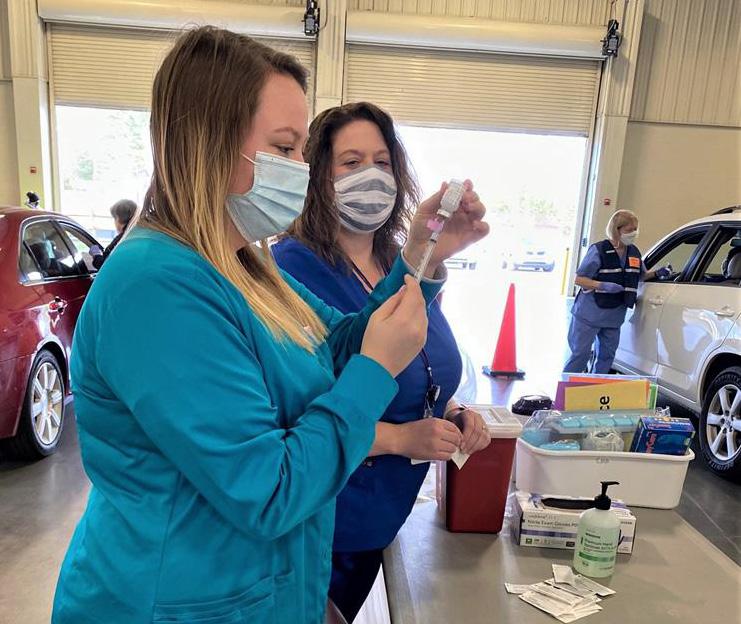 – Emily Fink Director of Nursing Programs at Rowan-Cabarrus.
– Emily Fink Director of Nursing Programs at Rowan-Cabarrus.
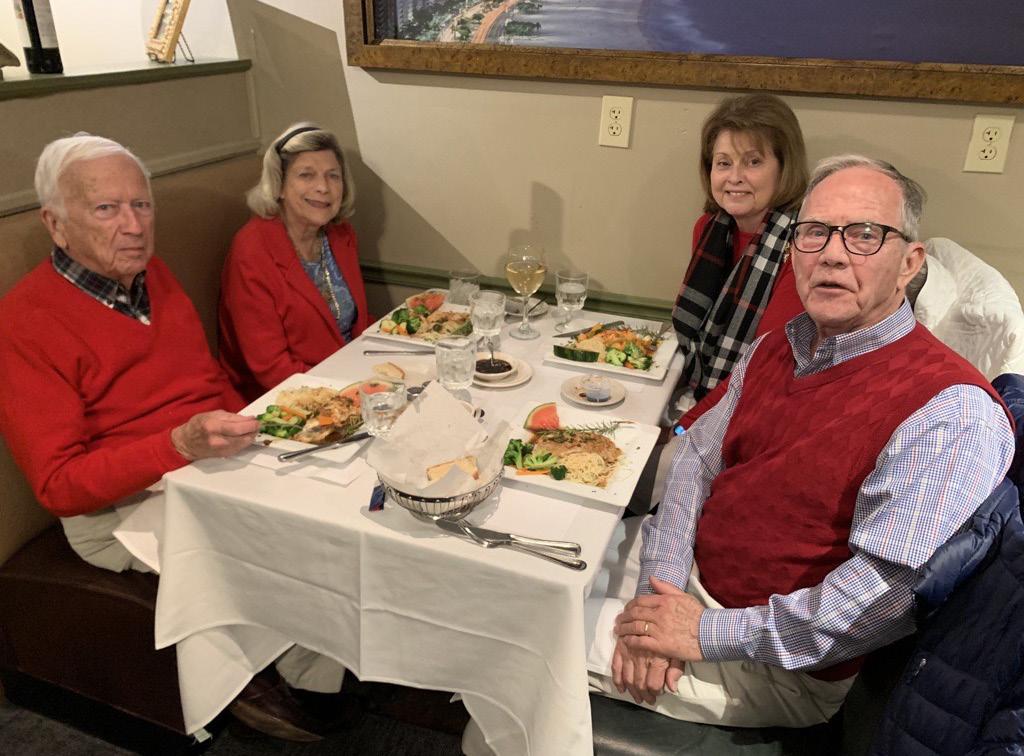
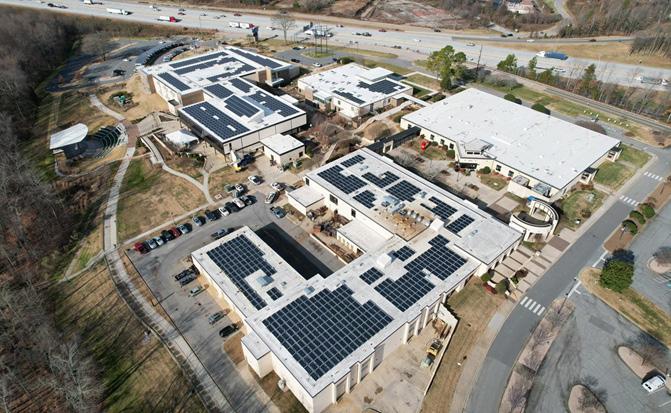
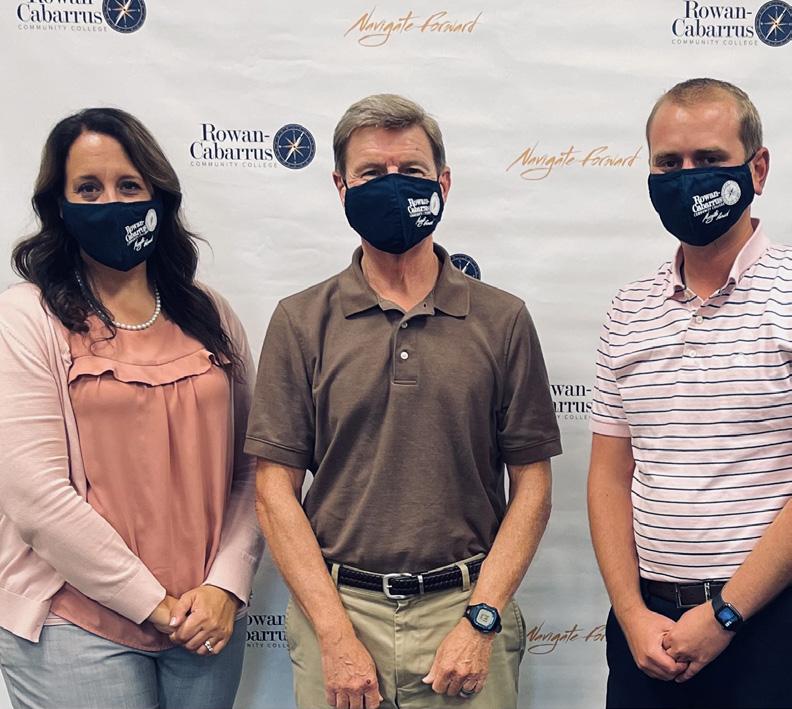

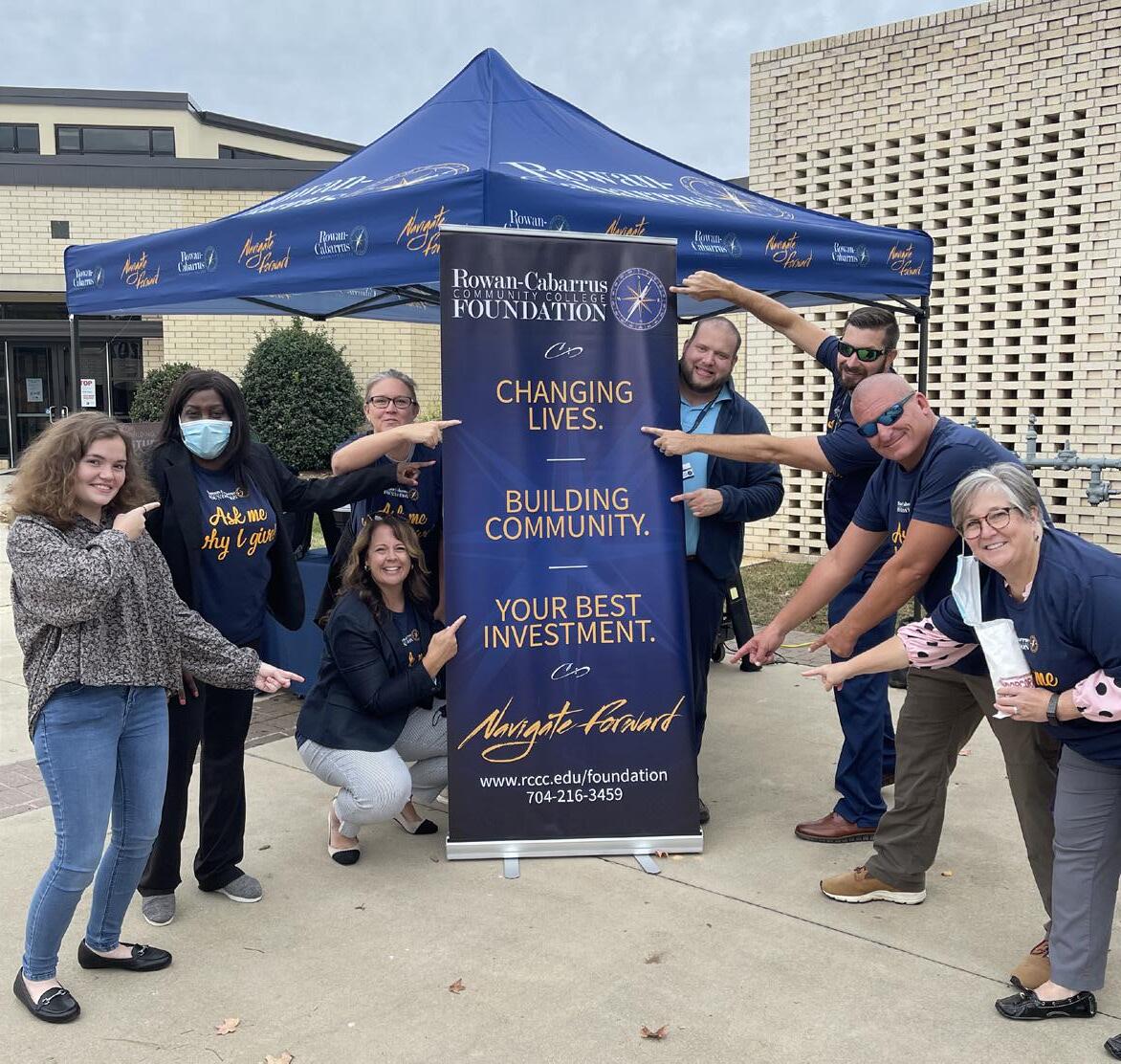
“An investment in helping a person change their life for the better is a gift to them, their family, and the entire community.”
– Brad Bost Rowan-Cabarrus Foundation Board Chair
As 2021 continued, it proved to be an atypical year for the Rowan-Cabarrus Community College Foundation. Unfortunately, the Foundation was unable to hold its “Changing Lives” scholarship luncheon in person due to COVID-19. The annual event celebrates the success of scholarship recipients and thanks those who generously made their journeys possible. Although the Foundation was unable to welcome guests face to face, members of the community remained inspired to answer the call to support scholarships and help meet the needs of our students.
As a result of the continued generosity of new and existing friends of the College, the Foundation established 13 new endowed scholarships totaling over $375,000 since 2019. The Foundation partners with Foundation for the Carolinas to manage its $3.6 million in currently held endowed scholarships. Endowed scholarships provide the opportunity for donors to make a lasting impact through a legacy gift. The Foundation invests the principal amount, and the earnings are expended annually in perpetuity to support student scholarships.
The Foundation provides financial assistance to hundreds of students every year, allowing them to focus on their educational goals with less concern about financial constraints. Donors fulfill their genuine philanthropic interests and make a lasting difference in the lives of students in our community.
“A dollar contributed to helping a student through a scholarship keeps on giving,” said Brad Bost, Foundation chair. “An investment in helping a person change their life for the better is a gift to them, their family and the entire community.”
Rowan-Cabarrus pursued other significant projects thanks to the contributions of donors, including continued work on the solar energy project on North Campus. A generous $3.35 million gift from local philanthropists Fred and Alice Stanback has been used to fund two rooftop phases of the solar project, along with a ground-mounted system, as part of a public-private partnership. The combined systems, once completed, will constitute the most extensive solar system at any North Carolina community college, providing energy equivalent to power 200 homes for a year and avoiding the introduction of roughly 2,000 tons of CO2 into the atmosphere.
“The solar project is a win-win,” said Dr. Carol S. Spalding, president. “We are able to be good stewards of the environment while also creating sustainability for students by using the income from energy produced to fund scholarships and more.”
The generosity of donors allows the Foundation to award scholarships, invest in vouchers for students to take their High School Equivalency tests, provide student emergency funding, support capital projects and fund innovative programs within the College. Each year, Student Impact Grants are awarded to faculty and staff who have creative ways to support students but no funding stream to implement these ideas. Student Impact Grant projects range from wellness initiatives to the popular “Exam Jam” event to help students with relaxation, study skills and other steps in preparing for exams.
Jessica Tarlton, a student who participated in the virtual Exam Jam, said the event gave her new ideas for memorization and helped her feel more confident.
“I learned about a new resource, studyblue.com, and how to use flashcards,” she said. “Flashcards can help me learn the material better, so I will use this tool when reviewing for my finals.”
“It is the Foundation’s privilege to support the College’s innovation through scholarships, Student Impact Grants, capital projects and more,” said Connie Rheinecker, Director of the Rowan-Cabarrus Foundation. “I am excited to be a part of a team that moves the needle for our community’s individuals, families and businesses.”
Helping students succeed is a team effort. The RowanCabarrus Foundation lives out its mission by setting the standard for philanthropic support that allows the College to meet students where they are and help them reach their full potential.
“Our community continues to move forward and thrive despite the challenges of the pandemic,” said Sarah Devlin, Chief Officer of Governance, Advancement & Community Relations. “Rowan-Cabarrus Community College plays a critical role in providing a quality education that not only keeps up, but leads the way in workforce development .”
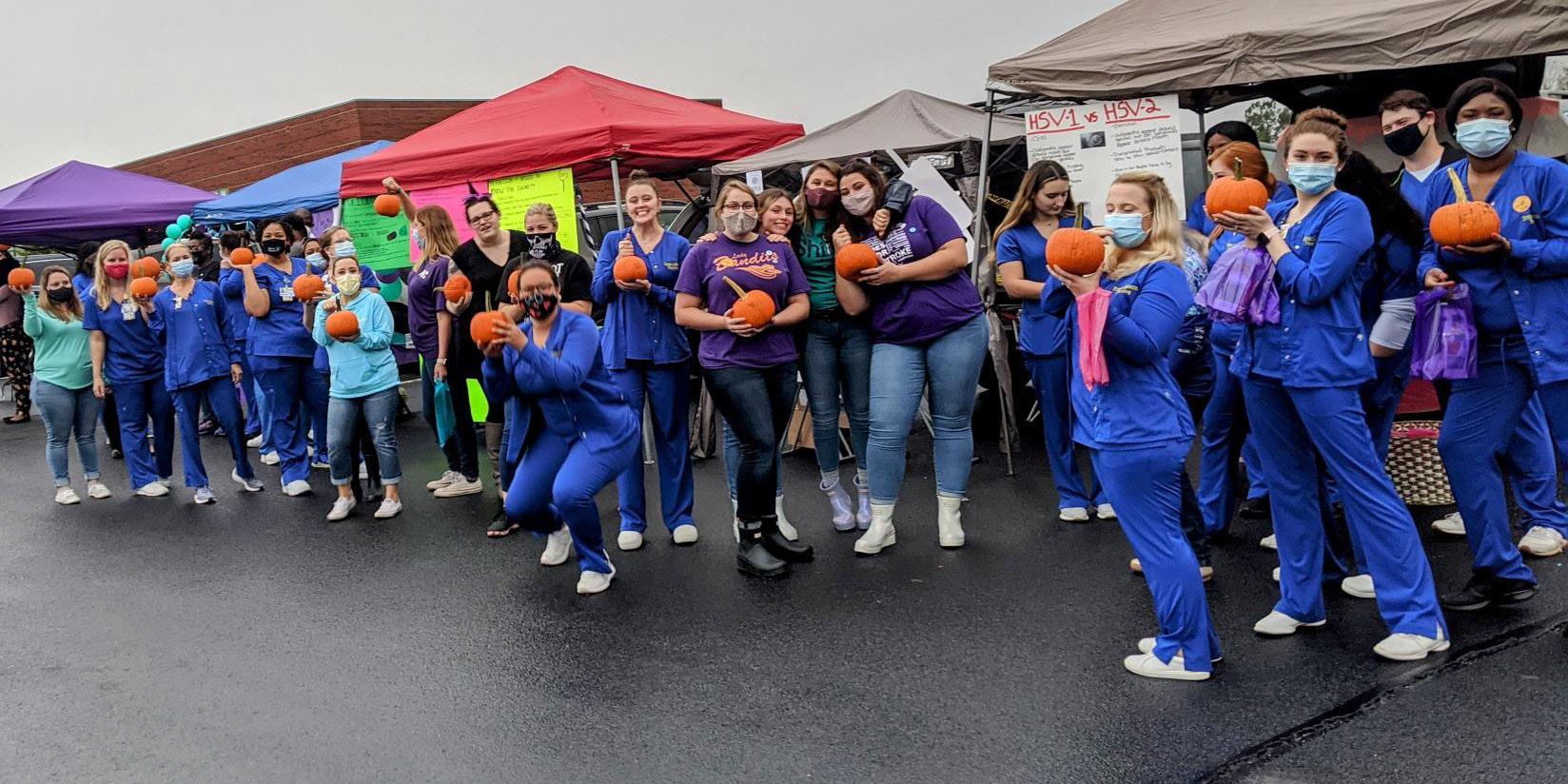

Rowan-Cabarrus Community College students have the opportunity for personal growth and leadership development by participating in many activities outside the classroom related to community engagement and citizenship.
Though the College continued implementing its “Stay Well, Stay Connected” plan to keep students, faculty and staff safe during the COVID-19 pandemic and many classes and events were conducted virtually, students took advantage of opportunities to connect and learn via socially distanced in-person experiences and virtual events.
A group of Rowan-Cabarrus leaders and students made a trip to Raleigh on Community College Day on June 15, 2021, visiting with members of the College’s North Carolina legislative delegation, including Harry Warren, Julia Howard, Wayne Sasser, Kristin Baker, Larry Pittman, Carl Ford and Paul Newton to advocate for the North Carolina Community College System’s legislative priorities.
Attending on behalf of the College were President Dr. Carol Spalding, Trustee Jeanne Dixon, Chief Officer of Governance, Advancement and Community Relations Sarah Devlin, Vice President of Student Success Services Natasha Lipscomb, Director of Student Life & Leadership Barb Meidl and three outstanding student leaders, Damola Ogunyami, Jeremy Post and Vallie Vazquez.
By involving students in proactive initiatives related to the legislative priorities of Rowan-Cabarrus and other community colleges, College leaders helped them understand governing processes and how to be effective advocates. In addition to supporting the legislative priorities of
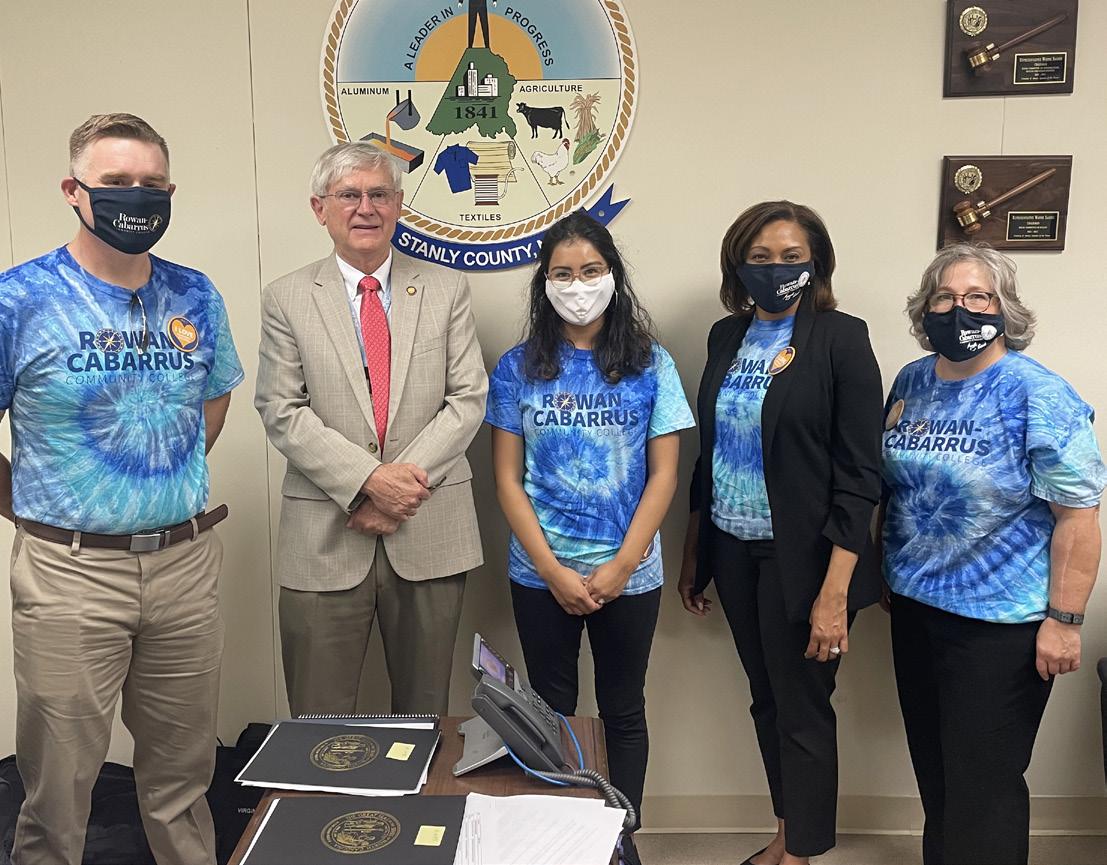
the state’s community colleges, the students were able to champion important policy and legislative changes to make a difference at the state level.
The state’s legislative priorities included increasing employee salaries; attracting and retaining key faculty and staff to prepare the state’s future workforce in high-demand fields; maintaining budget stability for colleges experiencing enrollment declines due to COVID-19; funding modern and secure IT systems; funding cybersecurity positions to maintain ultimate technical security; and including community colleges in capital funding proposals.
The College’s Student Life team took the lead in spearheading many initiatives to keep students engaged during the pandemic. While much of the state and nation continued working and studying from home, Rowan-Cabarrus students were able to avoid feeling isolated by participating in a range of civic, social and leadership events.
As students become more savvy and cost-conscious consumers, four-year universities are no longer viewed as the only path to a bachelor’s degree. Many students prefer to embark on a “two plus two” option, completing two years at Rowan-Cabarrus before transferring to a four-year institution to finish the remaining two years.
“With the cost of college continuing to rise, many students are ‘customizing’ their education in the way that makes the most sense for them, and we are confident they are making the right choice when they start at Rowan-Cabarrus,” said Dr. Carol S. Spalding, president. “The high quality and affordability of our classes are persuading more students to begin their quest for a bachelor’s degree at a community college. Our small classes, taught by accomplished faculty members with a minimum of a master’s degree, give students the individual attention they deserve.”
Rowan-Cabarrus has strong relationships and partnerships with universities across North Carolina, offering transfer students more options than ever. The College’s online Transfer Center provides a wealth of information, and the personal advising and dedicated transfer team help students make informed choices and ensure that their credits transfer.
Thanks to agreements with the University of North Carolina’s 16 universities, hundreds of students a year transfer from Rowan-Cabarrus to the UNC system, and many others transfer to private or out-of-state colleges.
Rowan-Cabarrus also has partnerships with some of the most popular transfer destinations among its students, allowing benefits for the community college’s students when they enroll. Three recently signed transfer agreements include the 49erNext program at UNC Charlotte, which allows students to pursue nearly all the 130 majors offered, as well as the Pathway to Excellence program through UNC Wilmington, which has seen the number of transfer students from Rowan-Cabarrus nearly double since it launched in 2019. Nearby Catawba College partners with the College to offer the Learn Local, Grow Local agreement that enables seamless transfer
into more than 50 programs, and Pfeiffer University’s Pfeiffer Pact offers Rowan-Cabarrus transfer students 14 pathways with guaranteed financial support, plus added discounts for fully online students.
“Our expert faculty and their commitment to students and excellence in their respective fields is one of the most rewarding parts of attending college at RowanCabarrus, and our students perform extremely well when they transfer to four-year institutions,” said Vice President of Academic Programs Dr. Michael Quillen. “Our instructors are top-notch, with faculty holding degrees from some of the most esteemed graduate programs in the country. They conduct research, publish articles and books and regularly contribute to their professional fields while leading students into the future through education. In fact, many of our part-time faculty members teach the exact same courses at universities that they do at Rowan-Cabarrus.”
Rowan-Cabarrus transfer students take courses with the same level of rigor and expertise as those at four-year colleges and universities at a fraction of the cost, with the added advantages of smaller classes and more personal attention from faculty.
While many degrees at Rowan-Cabarrus transfer to fouryear institutions, the College’s traditional college transfer degree programs include Associate in Arts, Associate in Engineering, Associate in Fine Arts in Visual Arts and Associate in Science. In addition, some technical degree programs also transfer on a case-by-case basis.
“Rowan-Cabarrus students are well-prepared to transfer and these articulation agreements give them many opportunities to seamlessly complete their four-year degrees at excellent colleges and universities once they graduate.”
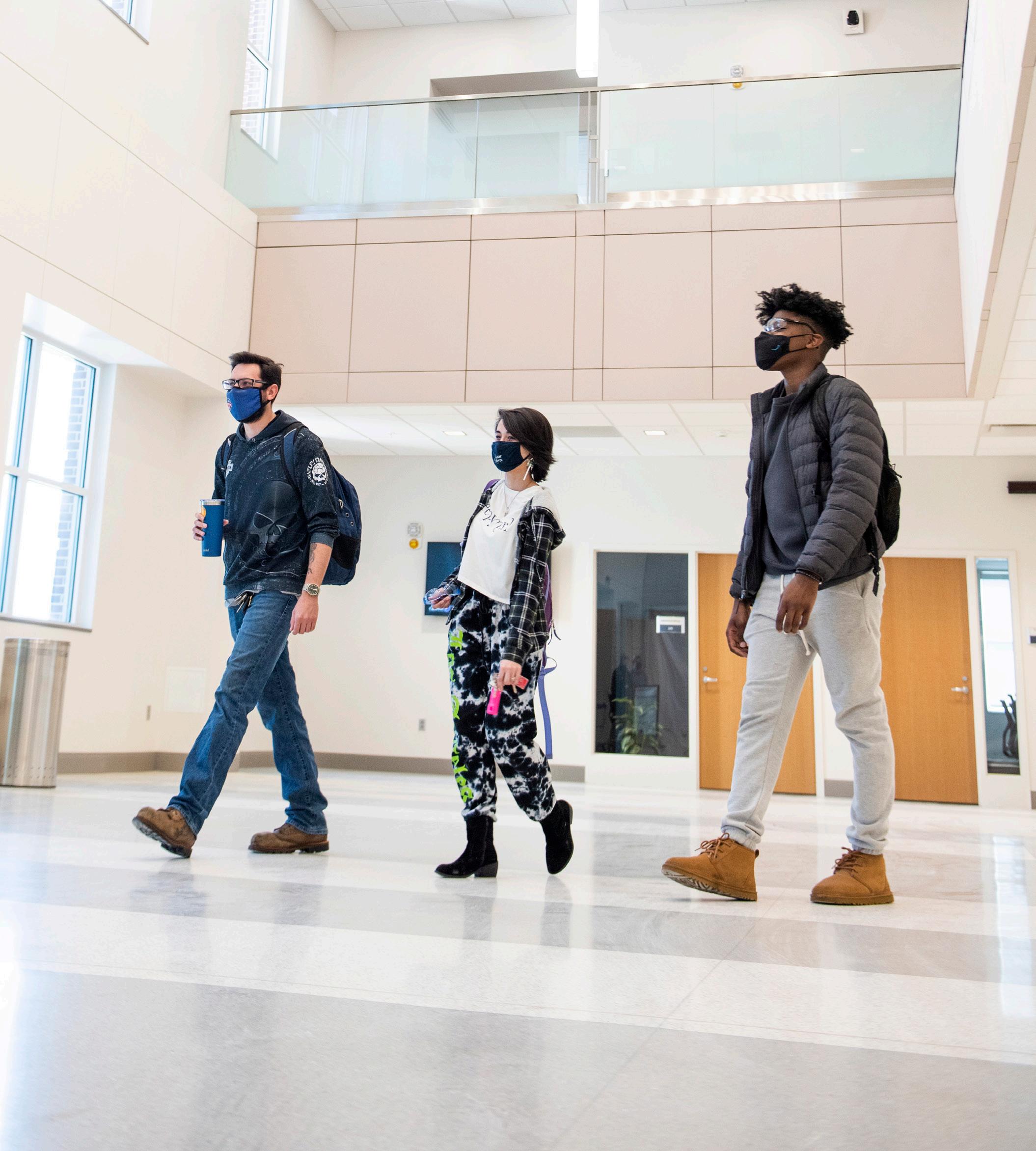 – Dr. Michael Quillen Vice President of Academic Programs
– Dr. Michael Quillen Vice President of Academic Programs

High school juniors and seniors seek out the Career & College Promise (CCP) program at RowanCabarrus Community College to gain experience in a higher education setting and get a “jump start” on college credits. Career & College Promise reinforces the longstanding partnership with our local K-12 school systems, offering juniors and seniors the golden opportunity to take college classes tuitionfree. In addition, Rowan-Cabarrus works alongside area school systems to support three early college high school programs, including the Cabarrus/ Kannapolis Early College, the Cabarrus Early College of Technology, and the Rowan County Early College. These programs allow students to earn their high school diploma and an associate degree from RowanCabarrus simultaneously.
Rowan-Cabarrus is also a state leader in providing college-level Career & College Promise courses. The College has experienced continued growth in Career & College Promise course enrollment, with an average increase of over 400 students per year (32% growth) since 2016. In 2020-21, the College served 3,029 students (unduplicated) in CCP courses.
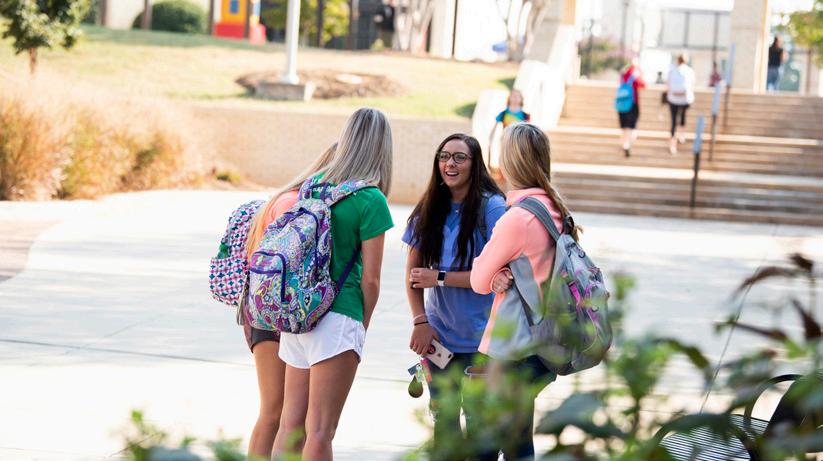
“Programs like Career & College Promise are a wonderful avenue for students to get ahead,” said Dr. Carol S. Spalding, president. “By experiencing real college classes, students not only get free college credits, but ultimately feel better prepared for their next step in life.”
Daniel Leonard, a graduate of Jesse C. Carson High School, made the most of his chance to get ahead, taking four CCP classes during his senior year and adding two more the summer following graduation. He then enrolled at Rowan-Cabarrus to study HVAC technology and electrical engineering.
With the money he saved taking CCP classes and the affordability of Rowan-Cabarrus, Leonard’s plan was to graduate and go right to work without the burden
of student debt. “I would tell any high school student to get involved in the CCP program, not only to save money, but to get a better idea what college is all about and to figure out what they want to do,” he said.
To enhance the ability for students to take advantage of Career & College Promise opportunities, high schools in the Rowan-Cabarrus Community College service area are fully accredited as off-site locations by the Southern Association of College and Schools Commission on Colleges (SACSCOC). Rowan County high schools include East Rowan, Henderson Independent, Jesse Carson, Salisbury, South Rowan and West Rowan. Cabarrus County high schools include Central Cabarrus, Concord, Cox Mill, Hickory Ridge, Jay M. Robinson, Mount Pleasant, Northwest Cabarrus, and Performance Learning Center.
The Career & College Promise program offers two tracks, one for students to specialize in a career or technical pathway such as criminal justice, machining, cosmetology, or welding, and another for students to prepare for general transfer.
“I think it’s awesome that high school students can have a chance to experience college-level classes,” said Chloe Patterson, who received college credits during her time at West Rowan High School before enrolling at N.C. State University. “The classes helped me with responsibility and time management, which are so important in college. Plus, the courses helped me get ahead and save money.”
The College selects a group of outstanding students each year as official Rowan-Cabarrus Student Ambassadors. Ambassadors reach out to prospective students, conduct campus tours, participate in and help promote various college events, and assist with the successful transition of new students to the campus.
The Ambassador program, which began in 2010 and is sponsored by the Rowan-Cabarrus Foundation, provides scholarships to the student participants, as well as offering robust leadership development opportunities.
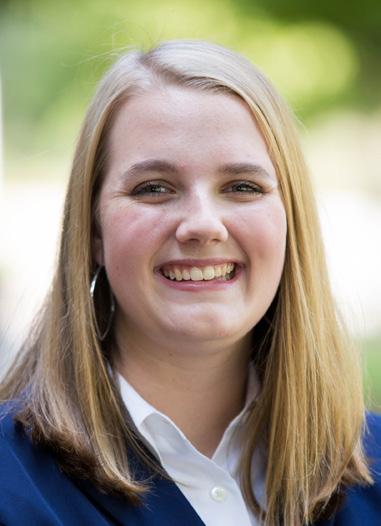
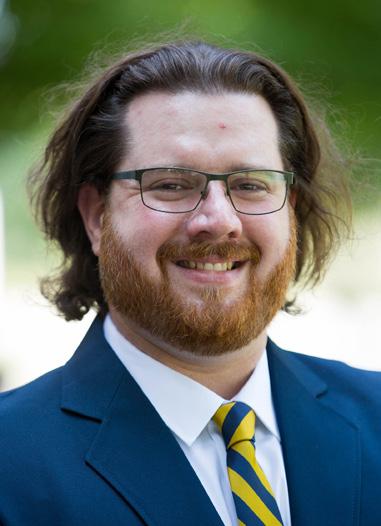
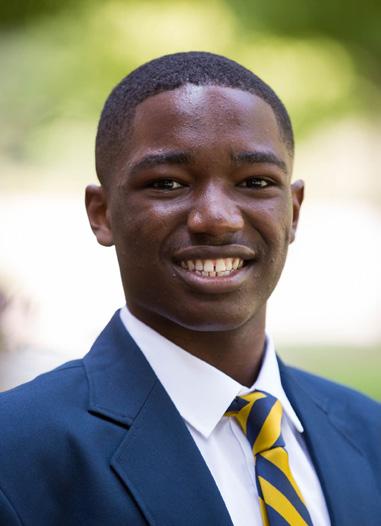
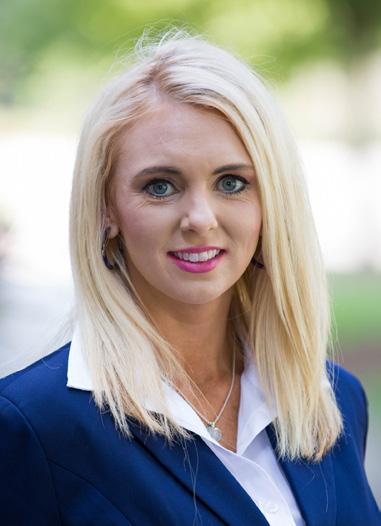
“Ambassadors act as liaisons between the College and prospective students, their families, guests, alumni, business partners and the community,” said Rowan-Cabarrus Director of Student Life and Leadership Barb Meidl. “This unique leadership
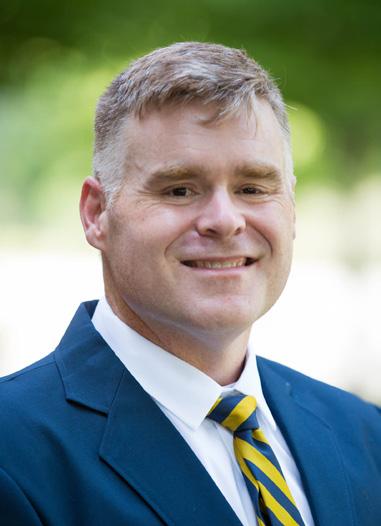
opportunity enables these students to develop skills that will benefit them well beyond their time at Rowan-Cabarrus, including public speaking, networking, communication and interpersonal skills.”

Representing the College for the 2021-2022 term are: Grace Dunn (Associate in Arts); Haywood Hayes (Associate in Arts); Jadyn Koranteng (Associate in Arts, Business Administration); Jeremy Post (Associate in Arts); Mike Rummage (Associate in Applied Science, Information Technology and Information Systems); and Lauren Watkins (Associate in General Education).
“I am proud to work with this group of Ambassadors,” said Dr. Carol S. Spalding, president. “By becoming leaders on campus and in the community, they are developing the skills they will use to be successful in the future.”
Grace Dunn Haywood Hayes Jeremy Post Mike Rummage Lauren Watkinsowan-Cabarrus Community College Excellence in Teaching awards recognize faculty who go beyond the expected levels of delivering instruction and improving educational excellence in serving students.
Eric Savage and Sondra Thorson were selected as the College’s Excellence in Teaching award recipients for 2020-2021.
During the 2020-2021 academic year, Eric Savage was a full-time math instructor at Rowan-Cabarrus. He holds a Bachelor of Science in Mathematics, with a minor in History, from Lees-McRae College and a Master of Science degree in Mathematics with a minor in Statistics from the University of Tennessee – Knoxville.
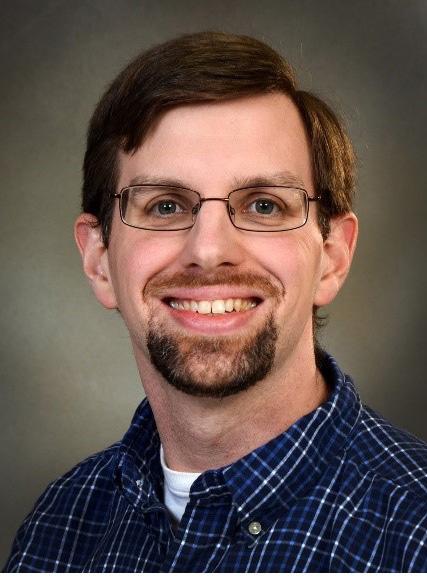
Sondra Thorson, part-time recipient, has been an adjunct business administration instructor
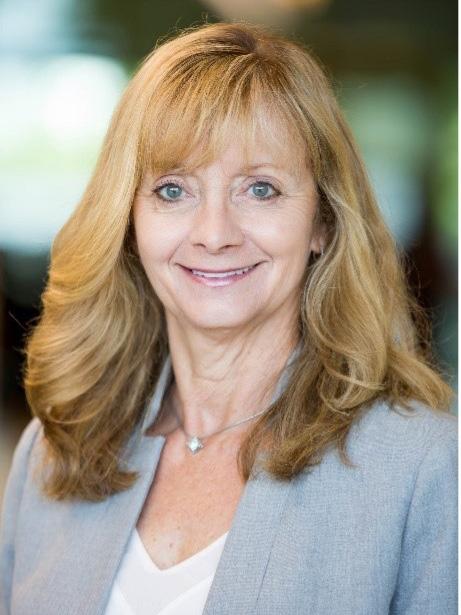
at Rowan-Cabarrus for more than 15 years. She holds Bachelor of Science and Master of Business Administration degrees from West Virginia University.
“At Rowan-Cabarrus Community College, we are proud of the highly qualified and dedicated faculty who make our academic programs so strong,” said Dr. Carol S. Spalding, president. “Eric Savage and Sondra Thorson are shining examples of our tradition of hiring caring, professional instructors, and they are both very deserving of this honor.”
he Rowan-Cabarrus High School Equivalency (HSE)/GED program is designed for adult students who test above a ninth-grade level in math and reading but have not obtained a high school diploma. The program prepares students to successfully pass an approved High School Equivalency Assessment (HSEA) to earn their high school equivalency diploma. An Adult Basic Skills program is available to prepare adult students who test below a ninth-grade level in math or reading to gain the skills to pursue their high school equivalency diploma.
When Amber DeVane decided to enroll to earn her North Carolina Equivalency, it had been 12 years since she had been in a classroom and she was determined to earn her high school diploma so she could better her life.
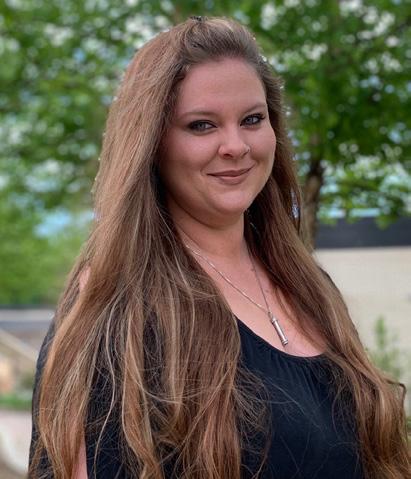
“I dropped out of high school because I didn’t focus on my studies like I could have,” DeVane said. “It was the worst mistake of my life, and to be able to go back and correct my wrongs is an amazing gift.”
Like most adults, her biggest challenge in going back to school to earn her high school diploma was time. With a full-time job and a family, prioritizing classes and study sessions was a challenge.
“When I felt exhausted, I would picture myself walking across the stage to get my diploma, and I knew no one would ever be able to take that away from me,” DeVane said. “I am grateful to RowanCabarrus and the amazing teachers who motivated and inspired me. They’re kind, genuine, and they care. I might have dropped out again without them.”
Instruction is free to all students in the HSE/GED program, and though there is a fee for the test, the Rowan-Cabarrus Foundation covers the cost for most students. Online courses are available for students who cannot attend seated classes.
Rowan-Cabarrus Community College held a completion ceremony for 21 students in its Skills, Opportunity, Awareness, Readiness (S.O.A.R.) program, recognizing their resilience and dedication to completing their studies despite the pandemic. The S.O.A.R. program helps adults with intellectual disabilities acquire literacy and life skills to become more independent.
Students walked the red carpet to receive their diplomas and were congratulated by faculty and staff, friends and family. The College created a festive atmosphere for the ceremony, with music, signs, tents, firetrucks, and a large American flag flying above the event site at North Campus. The College’s mascot, a red-tailed hawk named Beacon, also was on hand to congratulate the graduates on their accomplishments and pose for photos.
“We take great pride in the fact that our institution values everyone, and we are one of only a handful of community colleges offering a specific program designed for students with intellectual disabilities or traumatic brain injuries,” said Rowan-Cabarrus Executive Director of Adult Education and Literacy Jay Taylor. “We began the S.O.A.R. program at the North Campus in the fall of 2011 with just six students and, to date, we have proudly served over 100 students in Rowan County. Our campus community has embraced this amazing population. In fact, some of our former students have been hired by our institution and are now working alongside us as our colleagues.”
Evelyn Medina, owner of Mean Mug Coffee Company in downtown Salisbury, also has welcomed S.O.A.R. students to work at her business doing tasks such as folding napkins or serving drinks to customers.
“The idea of our partnership with the S.O.A.R. program was to bring people with cognitive disabilities into the community, not only to teach them soft skills and how to participate, but so that the community will recognize and appreciate them,” Medina said. “The S.O.A.R. program is incredibly important, not only for the disabled adults it serves,
but for the community as a whole. Sometimes people with disabilities – or as I say, people who are ‘differently able’ – stay in the shadows. If we leave them there, they will not be able to reach the fulfilled life they deserve. If we give them the opportunity, they will show us how high they can ‘soar.’ ”
The S.O.A.R. curriculum focuses on helping individuals become more independent and selfdirected by teaching specific skills needed to function successfully in daily life. Classes are built around each student’s unique strengths and goals, covering functional academics, community living, health and safety, leisure activities, and humanities. Students use computers and other technology and participate in campus and community activities.
To be eligible to participate in the S.O.A.R. Program, an individual must be 18 or older, not enrolled in the public school system, and either be diagnosed with an intellectual disability or functioning at the level of intellectual disability due to a head injury or brain damage. Students must achieve a minimum test score to be considered for enrollment and demonstrate progress to remain in classes. S.O.A.R. classes are offered at no cost to the student.
“We are passionate about meeting all students where they are and empowering them to go as far as they can go,” said Dr. Carol S. Spalding, president. “We are so proud of our graduating S.O.A.R. students. We celebrate their accomplishments, and we also treasure the many wonderful lessons they have taught us.”
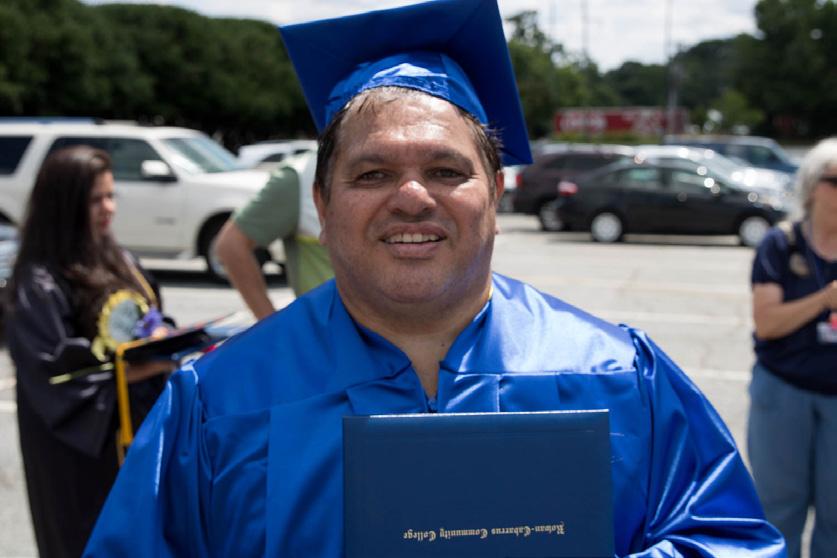
Students with Intellectual disabilities walked the red carpet to receive their diplomas
For people who have been displaced from their jobs or are looking for a short-term path to a new career, Rowan-Cabarrus Community College offers programs that can lead to lucrative positions in nine weeks or less. The College’s partnerships through the North Carolina Manufacturing Association and regional industries offer training for sustainable careers, with most tuition costs covered by scholarships.
The North Carolina Manufacturing Institute (NCMI) continues to thrive, with 45 partner manufacturers on board. Graduates with little to no manufacturing experience can secure employment by transforming themselves into career-ready manufacturing professionals through NCMI’s eight-week training program.

The NCMI is a partnership conceived with leaders from Rowan and Cabarrus counties from both chambers of commerce, economic development authorities, the Centralina Workforce Development Board, Mitchell Community College and RowanCabarrus Community College. The manufacturing businesses who are participating partners plan to hire many of the graduates, and nearly 90 percent of graduates secure full-time employment within one month of completing the program.
“It doesn’t matter what your background is; it matters what your future is,” said Craig Lamb, vice president of corporate and continuing education at Rowan-Cabarrus. “There are well-paying jobs in manufacturing available right here in Rowan and Cabarrus counties.”
Selected participants enroll in the NCMI program for free, thanks to support from local manufacturers. Individuals acquire knowledge and skills in safety, quality assurance, manufacturing processes and
maintenance awareness, graduating with national certifications. Classes cover industry-defined skills needed to work in a variety of supply chain-related roles including receiving, packing, shipping and processing.
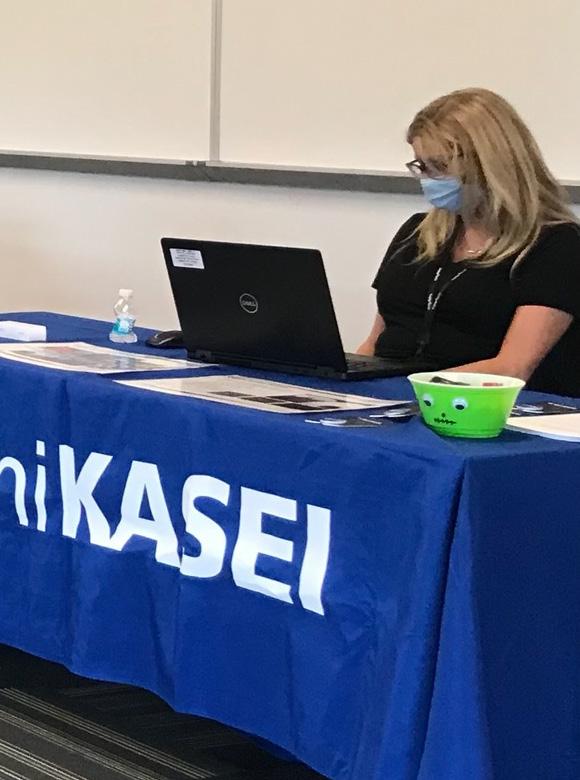
“I can honestly say I never would have gotten a job like this if I hadn’t received the NC Manufacturing Institute scholarship and gone through the training program,” said graduate Chris McDonald. “My work is satisfying. I have a real career now. I’m getting paid vacations for the first time in my life.”
With the College’s Certified Logistics Technician (CLT) program, Rowan County residents can be ready to fill logistics and fulfillment vacancies at companies like Chewy, Dillard’s, Aldi or Food Lion in just four weeks, with a full scholarship to pay for the certification program.
Jobs in global logistics facilities are a fast-growing employment segment in Rowan County, and the CLT program offers training that can give candidates the edge in landing well-paying jobs with good benefits and advancement opportunities.
“The College is committed to helping people move forward in their lives, and these programs assist job seekers in becoming the preferred candidates at the same time we help local companies access an able workforce that increases productivity,” said Dr. Carol S. Spalding, president.
The TRIO program officially launched at RowanCabarrus Community College in January 2021 with its first learning community of 130 students, providing more than 1,275 hours of support during the first year. The College was awarded a $1.3 million federal TRIO Student Support Services grant in September 2020 to be used over a five-year period to support low-income students, first-generation students, and students with disabilities with specialized services designed to increase their educational success.
We are grateful for this grant to enable us to offer specialized services to TRIO students so that they have a greater likelihood of success,” said Natasha Lipscomb, Vice President of Student Success Services. “The services offered through the program have been proven to help students overcome common college hurdles and complete their academic plans.”
The program provides academic tutoring, personal coaching, mentoring, financial guidance, career exploration, cultural enrichment opportunities, peer networking, and other assistance to increase retention and completion. TRIO students also have opportunities to participate in leadership conferences, college visits and tours of local industries to improve their networking skills. Each student has a TRIO advisor, financial aid advisor and personal librarian assigned to help and support them during their college journey.
“I joined TRIO because I was seeking a community of students like me who come from humble origins and yet understand the importance of their education,” said student Jasmine Rosenberry. “Being able to reach out to the TRIO staff with the many questions I had about college and transitioning into adulthood has really helped me grow and become a happier person.”
Rowan-Cabarrus is committed to engaging in meaningful dialogue and community engagement to address historical racial inequalities.
The College hosted the second annual “A New Way Forward with G.U.I.D.E. (Growth, Understanding, Inclusion, Diversity and Equity)” virtual diversity and inclusion conference in 2021. The event, which was free and open to the public, drew more than 1,000 participants to 30 different sessions.
“A New Way Forward with G.U.I.D.E.” addressed diversity, equity and inclusion issues in higher education, K-12, communities, and the workplace.
“Higher education must learn to address inequalities and be an active catalyst for equity,” said Dr. Carol S. Spalding, president. “Through this event, we hope to celebrate achievements, be inspired by best practices and learn how to drive change.”
The College also continues its commitment to contributing to the region’s rich cultural heritage.
In 2019, the Rowan-Cabarrus Foundation was awarded a $50,000 grant from the Z. Smith Reynolds Foundation’s Inclusive Public Art Initiative to create its own public art project. Rowan-Cabarrus was the only community college out of 10 organizations in the state to receive funding. The project installed audio-embedded benches in public spots including the Rowan-Cabarrus Community College’s North Campus, Catawba College and the Dixonville Cemetery in Rowan County. Through the audio narratives, marginalized members of the community have a chance to tell their stories.
The large, S-curved, interactive benches are accessible to all have the goal of advancing diversity and inclusion awareness in the community.
“We are grateful to the many members of our community who have contributed to this project,” said Dr. Spalding. “By listening to others’ stories, we can understand one another better and elevate ourselves as a community.”
The Small Business Center (SBC) at Rowan-Cabarrus Community College provides valuable resources for small businesses in Concord, Kannapolis, Salisbury and surrounding towns. Each year, community college Small Business Centers have an economic impact in 90 percent of all North Carolina counties, helping to create and retain nearly 3,000 jobs annually.
With the relocation of the Rowan-Cabarrus SBC to the new Cabarrus Center for Innovation and Entrepreneurship in downtown Concord, the staff has become part of a collaborative workspace that welcomes and supports new and existing businesses through educational programs, networking, events and more.
“Our clients will continue to receive the same services, with the added benefit of having partners like the Cabarrus Chamber of Commerce and Economic Development Commission under the same roof,” said Craig Lamb, vice president of corporate and continuing education at Rowan-Cabarrus.
The former Cabarrus Savings Bank building now features co-working spaces, meeting rooms and private offices, where partners and members can engage and work together internally and externally with the local business community.
“It’s a one-stop shop for business,” said Megan Smit, director of the Rowan-Cabarrus Small Business Center. “I’m excited about the new Cabarrus Center location, because there is a wide range of options for both new and established businesses. This type of collaboration and opportunity can be especially helpful for startups who need a business address or office location as well as mentoring and support.”
For small businesses, programs such as BRACE (Business Rebound as COVID-19 Evolves) have been implemented to offer free assistance such as coaching, assessment and recovery guidance to qualifying business owners.
Thanks to a $12,500 grant from Wells Fargo, the Small Business Center was able to provide free remote counseling to owners struggling to stay afloat during the pandemic. Salisbury business owner Tonyan Schoefield, who opened Tonyan Grace Boutique in 2019, was one recipient grateful for the assistance.

“I liked the fact that the Small Business Center went into ‘save small business’ mode early in the COVID crisis,” Schoefield said. “I felt like I wasn’t in it by myself. Someone else believed in what I was doing, whether they had a boutique or not, and that helped me believe I could get through it.”
Tonyan Grace Boutique, located at 210 South Main Street in Salisbury, carries clothing, accessories and more for sizes 12 to 28. The BRACE program helped Schoefield adapt her business in ways she hadn’t considered and boost her revenue while foot traffic to the store was down. “Even though 2020 was a horrible year, my year did not end horribly,” she said. “And the plus is that these strategies will continue to help my business thrive.”
North Carolina Community College System President Thomas A. Stith III made his first in-person visit to Rowan-Cabarrus Community College in June 2021. He toured the College’s North Carolina Research Campus facilities in Kannapolis, attended a joint meeting of the Rowan-Cabarrus Foundation and Board of Trustees, and even had a chance to experience the driving simulator used to train students in the fire and emergency services programs.
“We were delighted to host President Stith and show him firsthand how Rowan-Cabarrus is changing lives through education every day,” said Dr. Carol S. Spalding, president. “As one of North Carolina’s ‘Great 58’ community colleges, we are working alongside him to lead economic recovery efforts, prepare students for employment in growing industries, and increase the state’s visibility as a global competitor in business.”
At the Rowan-Cabarrus Advanced Technology Center, Stith learned about cutting-edge programs that prepare students for in-demand, high-tech jobs in engineering, mechatronics, robotics, advanced manufacturing, and more. The center also includes flex lab and classroom space that is used by major corporate partners who have chosen Rowan-Cabarrus as national and international employee training hubs. He also visited the biotechnology and nursing programs next door, getting a glimpse of the stateof-the-art facilities and quality instruction that make these programs popular choices for students.
In October, Stith addressed business leaders at the Rowan Chamber’s Power in Partnership Breakfast. Stith spoke to a room full of business and education leaders and two state representatives, Rep. Harry Warren and Rep. Wayne Sasser. He covered several community college-related topics in his speech, but focused primarily on the connection between businesses and two-year educational institutions.
Stith said North Carolina community colleges are
preparing the workforce for a global economy through apprenticeship programs and other initiatives. “The community colleges are the job engine for North Carolina,” Stith said. “The ‘Great 58’ serve 700,000 students per year, and I appreciate the support and commitment of Rowan-Cabarrus Community College as we move forward and continue to provide a pathway to opportunity for North Carolinians.”
With available scholarships and financial aid, Stith encouraged interested individuals to explore the idea of attending community college. “There are financial avenues, scholarships and grants that will, in many cases, cover the cost of tuition and fees for students,” he said. “Certainly, in the coming years, our accessibility and affordability should position us to be the first choice for higher education.”
Stith is passionate about the role of community colleges in driving sustainable economic growth in North Carolina by providing opportunities for students of all ages to build stable careers in highdemand industries.
Students who attended North Carolina community colleges between 2009 and 2019 accounted for 33 percent of the state’s wage earners, totaling 1.7 million people and $60 billion in wages earned in fiscal year 2020.

The purpose of the RowanCabarrus Community College Foundation is to raise and manage funds, and enhance relationships that support the work of the College.
Thank you to the following individuals, corporations, foundations and organizations for contributing to the RowanCabarrus Foundation. This listing represents gifts during the 2021 calendar year and every effort has been made to include all contributors. If your name was omitted, please know that your gift is appreciated and will be acknowledged.
Robert Abbate
Abigail’s: A Cake Affair
Academic Learning Center
Karen Alexander
Keri Allman
Rebecca Anderson
Cordelia Andrews
Kelli Antonides
AR Workshop Concord
Atrium Health
Bad Daddy’s Burger Bar
Lynda Banks
Janice Barbee
Rene Barger
Kim Barnett
Wendy Barnhardt
Brian Barringer
Barton Malow Foundation
Beacon Solar Two, LLC
Carol S. and Tripp Beaver
Amanda Belleville
Marjorie Benbow
Andra Bennett
Benjamin Benson
Miriam Berrospi-Kish
Sarah Berthold
Jack and Trudy Beverly
Jenny Billings
The Blanche & Julian Robertson Family Foundation
Blowin’ Smoke BBQ
Jenny Bodenheimer
Bonefish Grill
Dan and Teena Boone
Boral Building Products
Bob Bost
Brad Bost
Tom Bost
Norma Brice
Tammi Brigman
Paul and Melissa Brown
Brown Antique Equipment
The Budd Group
Erin Burris
Cabarrus Arena & Event Center
Cabarrus Brewing Company
Cabarrus Regional Chamber of Commerce
Dari Caldwell
Larry Campbell
The Charles A. Cannon Charitable Trust
Canteen
Carolina Beverage Group, LLC
Carolina Golf Mart & Driving Range
Carolina Hurricanes
Carrabba’s Italian Grill
Kellie Cartwright
Casco Signs
Kelly Castelloe
Adeline Caton
Scott Cattano
Century 21 Towne & Country
Jonathan and Cameo Chamberlain
Cathy Chandler
Charlotte Knights
Charlotte Motor Speedway
Charlotte Pediatric Dentistry
Cheerwine
ChemSearch
Chick-Fil-A
Ward Childress
Catherine Christie
Joe Christie
Richard Clarke, II
Ken Clifton
Cloninger Ford-Toyota
CMTA, Inc.

Colonial Life Insurance
Comfort Suites Salisbury
Concord Engineering and Surveying, Inc.
Shemeda Conyer
Caroline Cook
Cathy Cook
Barbra Cooper
April Cosner
Lynn Coughenour
Martha Cranford
Donna Crook
Paige and Daniel Crowe
Crumbl Cookies
Kevin Crutchfield
Anne Curlee
Custom Golf Supply, Inc.
D & B Realty, Inc.
Todd Dameron
Dave & Buster’s
Sarah Devlin
Diane and Bruce Halle Foundation
Thomas and Jeanne Dixon
DLB Trucking, Inc.
Downtown Salisbury, Inc.
DPR Construction
Christina Dryman
Duke Energy Foundation
Jim Duncan
Aimee Durham
Bill Dusch
Windsor and Katharine Eagle
April Elrod
Lee Ennis
Escape Central
Nekita Eubanks
Emily Fink
First Bank
Michael and Ashley Fischer
Fisher Greene Insurance Agency
Locke and Cathy Floyd
Shirley Foley
Food Lion
Brian and Brooke Francis
Kelly Freeze
Bennie and Pat Fulcher
Tonya Gaydick
Gene Haas Foundation
Godley’s Garden Center & Nursery
Angela Graham
Great Wolf Lodge
Dianne Greene
Amanda Gregory
Stacey Griffin
Tom and Jen Hamilton
Tracie Brunt Hampton
Hampton Inn - Salisbury
Brian Hanzel
Larry Harrison
O. Charles Harriss, Jr.
Mary Jane Hartley
Chandy Haskins
Zinat Hassanpour
Joy Haynes
The James & Paula Hays Charitable Fund
Leslie Heidrick
John Henderlite
Brian Hiatt
Hilbish Ford Lincoln Mercury
Hino Motorsports Sales USA
Casey Hinson-Stapleton
Jonathan Hoffman
Brandon Hoffner
Holiday Inn Express & Suites
Hannah Holliway
Rebecca Hooks
Kara Horn
Pat Horton
Hounds Ear Club
Dwight and Carla Howell
Zackary Hubbard
Mike Huffman
Timothy Hunter
Hydraulic Depot/Custom Design/ Tool Rental Depot
Imperial Brown
Ken and Amy Ingle
Ironscales
Ivans Restaurant
Mark Jasmine
Jenkins-Peer Architects
JMS Southeast, Incorporated
Lacrissa Johansen
Sabrina Johnson
Barbi Jones
Keyth Kahrs
Lisa Kelly
David and Tracy Kenan
David and Katrina King
Kelly Kluttz
Kathy Knight
Rachel Kocken
Danielle Kuhn
Craig Lamb
Lisa Lancaster
Andy and Sally Landford
Brunson Lawrence
Learning Environments
Judy Lee
Theresa Leflore
Kimberly Lineberger
Dawn Lippard
Tony Lippard
Natasha Lipscomb
Little Diversified Architectural Consulting
Longhorn Steakhouse
Ande Lowe
Kelly and Michael Lowman
Luck Factory Games
Donna and Stan Ludwig
Michael Magee
Amy Mahle
Barbara Mallett
Donnie and Lynn Marsh
Cynthia Martens
McAdams
Kelly McCowan
Alicia McDaniel
Julie McDonald
Nicholas McEntire
Larry and Jennifer McKeehan
Cristy McKinney
Terri McKnight
McLaughlin Young Group
Barb Meidl
Wilmer Melton
Meredian Brick
Hanif Miller
Mindy Miller
Trina Miller
44 Mills
Matt Millward
Modern Edge Technologies
Melissa Mohlere
Misty and Carter Moler
Robin Moore
Moretz Law Group, P.A.
Morgan Ridge Railwalk
Morris South
Joshua Muench
Multi-Electrical Services, Inc.
Diana Myers
MyGroup
Cynthia Mynatt
NASCAR Hall of Fame
Sherie Neely
Debra Neesmith
Chris Nesbitt
New Sarum Brewery
Irvin and Sara Newberry, CPA
Chad Nichols
Michele Norton
Novant Health Rowan Medical Center
David Odom
Oiles America Corp.
Okuma
Olive Garden
Opkalla Inc.
Tena Pair
Alison and Nick Paladino
Cameron Parker
Brent Parks
Michelle Patterson
Sharon Craig Paul
Whitney Peckman
Clifford A. & Lillian C. Peeler Family Foundation
Pepsi Bottling Ventures, LLC.
Perdue Farms, INC.
Shawn Peters and Eric Edman
Darlene Pickman
Cassie Plott
James Poston
Potter & Co. P.A.
Neal Powell
The Property Pal
Publix Super Markets Charities, Inc.
Michael Quillen
Smita Quinn
Charles Randolph
Mike Raney
Melissa Reid
ReynGroup
Connie Rheinecker
P.J. Ricks
Dakota Rios
Laurie Robb
Rocky River Golf Course
Rodgers Builders, Inc.

Rowan County
Rowan Diagnostic Clinic
Rowan-Cabarrus Student Government Association
Jonathan Rowe
Angie Rusmisel
Adam and Crystal Ryerson
Matthew and Irene Sacks
Dusty Saine
Salcoa Contracting
Salisbury Country Club
The Salisbury Woman’s Club
Salsaritas
Sam’s Car Wash
Anni Satterfield
Carol Scherczinger
Allison Scott
Sea Life Aquarium
Jenn Selby
Dale Shoffner
Lisa Shores
Carl Short, Jr.
APCO Signs
Megan Smit
Hayes and Susan Smith
Miles and Kathy Smith, III
Smoke Pit
South Central Properties
Elaine Spalding
Dr. Carol Spalding and Dr. Francis Koster
The Speedpark at Concord Mills
Mark Spitzer
Fred and Alice Stanback
Brian Stevenson
Jillian Sturdivant
Chad and Kelly Tarlton
James Taylor
Jay Taylor
Taylor Clay Products Co., Inc.
Barbara Taylor-Lineberry
Amy Tefft
Alan Thompson
David Thompson
Ann Thorn
Thread Shed Uniforms
Tim Schenk Electric, Inc.
Truist Bank Concord
UNCC Athletics
United Beverage
Uwharrie Bank
Daniel Van Dyke
Dakeita Vanderburg
Vanderburg Enterprises, LLLP
Timothy and Gail Vaughn
Village Corner Comfort Kitchen & Bar
Vogue Cleaners
Vulcan Materials Company
Tammara Walker
Seth Waller
Walmart SupercenterKannapolis
Walmart Supercenter - Salisbury
Waste Management
Leslie Weatherhead
Wells Fargo Foundation
Sheryee West
Weyerhaeuser Giving Fund
Garrison White
James White, III
Jake Williams
Zhiviaga Williams
Tim Wilson
Tracy Winecoff
Carter Wingfield
Wolf Trail Engineering
Woodleaf Bowling Lanes
The Margaret C. Woodson Foundation, Inc.
World Fibers, Inc.
Sue Yates
YCH Architects
Families, friends and businesses honor and memorialize individuals, corporations and students through endowed gifts to the Foundation. Endowments are established and invested with a minimum gift of $15,000 and are permanent funding sources for programs, scholarships and other financial assistance. These funds provide the annual earnings to support these awards.
Ambassadors ($250,000 +)
Philip Morris USA Endowed Scholarship
Ralph W. Ketner Family Foundation Scholarship
Title III Endowment
Advocates ($100,000 +)
Charles R. Benson and James C. Deberry Faculty Memorial Scholarship
Dean R. and Betty I. Andrews Endowed Scholarship
Dr. Richard Brownell Endowed Merit Scholarship and Faculty/Staff Development Fund
Ervin W. and Miriam R. McCulloch Endowed Scholarship
Food Lion Endowed Scholarship
Martha Edith Walker Estate Memorial Endowed Scholarship
Terence C. Wallace Cybersecurity Endowed Scholarship
Champions ($75,000 +)
AkzoNobel Corporation Endowed Scholarship
Partners ($50,000 +)
Dai Nippon Endowed Scholarship
Edward and Susan Norvell Endowed Scholarship
Evelyn Kenerly Germann and William Joseph Germann Memorial Endowed Scholarship
Harry W. Stanhope Memorial Scholarship
Lillian C. Peeler Salisbury Woman’s Club
Promoters ($25,000 +)
Cabarrus Rescue Squad Endowed Scholarship
Lane C. Drye Memorial Endowed Scholarship
Daniel Hemric ‘Be the Change’ Endowed Scholarship
NC Paraplegia Association Endowed Scholarship
Optimist Club Endowed Scholarship
Ray and Lois Paradowski Family Endowed Scholarship
Salisbury Lions Club Clyde H. Harriss Memorial Endowed Scholarship
Student Emergency Scholarship Endowment
Susan Elaine Harrison Memorial Endowed Nursing Scholarship
Susan J. and Robert M. Smith Endowed Scholarship
Waddell Professional Development Endowed Fund
Endorsers ($15,000 +)

Ashley C. and Michael P. Fischer Endowed Scholarship
Austin G. Beverly Memorial Endowed Scholarship
Ben Mynatt Family Endowed Scholarship
Betty Honeycutt Endowed Scholarship
Brown Family Fire Protection Technology Endowed Scholarship
Carla G. Howell Endowed Scholarship
Charles C. Erwin Endowed Scholarship
Dr. Jarrett T. Chandler, Jr. Endowed Scholarship
Eddie Myers Memorial Endowed Scholarship
Edna J. Chrin Memorial Endowed Scholarship
Eric Bollenbecker Endowed Scholarship
Graham Spencer Endowed Scholarship
Harold and Hope Yost Endowed Scholarship
Harold C. Earnhardt Memorial Endowed Scholarship
Helen B. Earnhardt Memorial Scholarship
Jane Ellington Harris Endowed Scholarship
Jeanie H. Moore Endowed Scholarship
Larry Cloninger Family Endowed Scholarship
M.R. Locke & Cathy C. Floyd
Maria Hall Emergency Assistance Scholarship
Michael Chreitzberg Endowed Scholarship
Rowan-Cabarrus Community College Student Emergency Scholarship
Rachel B. Gaskey Memorial Scholarship
Sam R. and Louise May Endowed Scholarship
Sarah C. Kellogg Endowed Scholarship
Sonny Dale Haigler
Sue McCoy Cunningham Endowed Scholarship
Walter Almeida Endowed Scholarship
William and Nancy Stanback Endowed Scholarship
Other Endowed Funds
Carroll T. Overton Endowed Scholarship
Clyde H. Harriss Family Memorial Endowed Scholarship
Draft and Design Endowed Scholarship
Marion Purcell Endowed Scholarship
Richmond Gage Memorial Endowed Scholarship Fund
Gifts of $1,500 or more may create a named scholarship or program fund. Contributions at this level offer the financial support for successful completion of a certificate, diploma or degree. Program funds provide enhancements to the classroom and learning experience.
Derek Sorrell Memorial Scholarship
Dr. David Moore Pediatric Dentistry Scholarship
Dr. Van Madray Accelerate Your Degree Scholarship
Dr. Windsor and Kathy Eagle Turnaround Scholarship
Dr. Windsor and Kathy Eagle Nursing Scholarship
Fine Art & Applied Arts Scholarship
F&M Bank High School Merit Award
Fred & Alice Stanback Scholarship
Gene Haas Foundation Scholarship
Harrison RV Trade Scholarship Endowment
Horton-Honeycutt-Propst-Vanderburg-Brown Scholarship
Keith Wayne Cook Automotive Scholarship
Melissa Zimmerman Scholarship
NCLEX Assistance Scholarship
Next Step Bridge Scholarship
North Carolina Manufacturing Institute Sustainability Scholarship Fund
RAD Alumni Scholarship
Rowan-Cabarrus Student Impact Grant Fund
Sam Leder “Got Your Back” Scholarship
Salisbury Rotary Club Scholarship
Salisbury Rowan Home Builders Association Scholarship
The Bridge Scholarship
The Leadership Cabarrus How You L.E.A.D Scholarship
The Margaret C. Woodson Foundation Scholarship
Vulcan Materials Scholarship
Weyerhaeuser Scholarship
(January 1, 2021 – December 31, 2021)
Total Grant Funds: $26,990,219

The Blanche and Julian Robertson Foundation: Building a More Prosperous Community to Strengthen Rowan County’s Future – Operating support - $15,000
Cabarrus County Partnership for Children: Early Education and Leadership Liaison – personnel and program support to increase engagement in the Early Childhood Education program$240,000
Cannon Charitable Interests: Teaching Auditorium Renovation – funding to support the renovation of the North Campus teaching auditorium$200,000
Department of Education via Rand Corp: Connecting College Students to Public and Community Resources: An experimental evaluation of Single Stop - $60,000 (Year 2 of 3)
Department of Education/TRiO Student Support Services: The TRiO/SSS Learning Community @ Rowan-Cabarrus – funding to support number of disadvantaged, low-income college students, first-generation college students, and college students with disabilities in the United States who successfully complete a program of study at the postsecondary level - $261,888
Duke Energy and Piedmont Natural Gas Foundation: Community College Grants Program – funding to support the Industrial Maintenance Apprenticeship program via scholarships, equipment and instructional supplies - $200,000 (Year 4 of 4)
Duke Energy Foundation: Modernizing welding equipment to improve student learning - $25,000 Economic Development Administration (EDA) – Upfit of ~17,500 SF of the new Advanced Technology Center in Cabarrus County$2,040,000 (Year 3 of 3)
Gene Haas Foundation: funding supports scholarships for machining and engineering technology students - $12,000
The Rowan-Cabarrus Community College Foundation would like to express appreciation to Fred & Alice Stanback for their support of the North Campus solar project and student scholarships.
Higher Education Emergency Relief Fund: Institutional – funding to prevent, prepare for, and respond to COVID-19 - $11,037,902
Higher Education Emergency Relief Fund: Student Aid – funding to provide emergency financial aid grants to students - $8,338,412
Higher Education Emergency Relief Fund: Strengthening Institutions Program (SIP)funding to prevent, prepare for, and respond to COVID-19 - $833,839
Margaret C. Woodson Foundation: Removing Educational Barriers – scholarships and emergency student aid - $20,000
National Institutes of Health (NIH): Bridges to Baccalaureate (B2B) program – in collaboration with UNC-Charlotte and Gaston College, this sub-award via UNC-C will support activities to address the needs of academically qualified students to foster success beginning at the Community College and continuing through UNC-C in the area of Biomedical Sciences.
$50,701 (Year 3 of 5)
National Science Foundation (NSF) Advanced Technological Education (ATE): Increasing Women in Engineering and Industrial Technologies (WE IT) – funding will support strategies in changing the perceptions of these industries within the populations of career influencers and potential students, specifically targeting and engaging female students to increase their awareness of these occupations. -
$224,093 (Year 3 of 4)

National Science Foundation (NSF) Advanced Technological Education (ATE) subaward via NC State: The Robotics/Automation and Cybersecurity Knowledge Sharing Coordination Network (TRACKS – CN) - $32,392 (Year 2 of 3)
National Science Foundation (NSF) Scholarships in Science, Technology, Engineering and Math (S-STEM): STEM Persistence and Retention via Curricula, Centralization, Cohorts, and Collaboration (SPARC4) – this grant, a collaboration with UNC-Charlotte and Gaston College, will improve students’ academic and social preparation for the college context and reduce the probability of experiencing “transfer shock” upon enrollment at a four-year institution. Funds will provide eligible students’ scholarships to both Rowan-Cabarrus and
UNC-C upon transfer. Approximately 15 students may receive up to $6,000 per year to cover unmet financial need. - $1,027,715 (Year 4 of 5)
North Carolina Career Coach Program: funding to support the expansion of the Career Coach program to three full-time coaches in Rowan County - $158,328/year (Year 3 of 4)
North Carolina Career Coach Program: funding to support the expansion of the Career Coach program with the addition of one full time coach in Kannapolis - $39,582/year (Year 2 of 3)

NC Works Local Innovation Fund: RE-Build Your Future – scholarships and assistance for former offenders to attend training; training for employers on what it means to be a second chance employer - $400,000 (Year 3 of 4)
SECU Foundation: Bridge to Career Cohort –scholarships - $18,000
U.S. Dept. of Education: 2016/17 Carl D. Perkins Career and Technical Education Act GrantFunding for career and technical education in student services and curriculum (includes Reserve funds awarded) – $409,516
Wells Fargo Foundation: Retail Lab Pilot Program - $15,000
Weyerhaeuser Giving Fund: Student scholarships - $1,000
Workforce Innovation and Opportunity Act (Title II): Adult Education and Family Literacy –funding to support adult education and literacy activities - $1,329,851
1. LEARN: How can Rowan-Cabarrus Community College increase the community’s educational attainment that leads individuals, families and the region to prosperity, sustainability and success?
1.1 Achieve high-quality learning for every student.
• Celebrated student Trent Phillips being recognized as the 2021 William D. Weston Outstanding Student of the Year from the North Carolina Work-Based Learning Association. The College’s students were awarded the NC Work-Based Learning Association student of the year two of the past three years.
• Partnered with RJG, a recognized international leader in plastic injection molding training, consulting and technology to develop the RJG Plastic Injection Molding Training Program.
• Partnered with Okuma America Corporation to establish the Okuma Machine Tool Academy as a flagship training center for Okuma customers, distributors and employees in the western global hemisphere.
• Supported 94 low-income students, first generation students and students with disabilities through the TRIO Student Support Services program to increase the retention and graduation rates of students in underserved populations.
• Provided over 420 hours of support through academic tutoring, personal coaching, mentoring, financial guidance, career exploration, cultural enrichment opportunities, programming, and other assistance to increase retention and completion via the TRIO program.
• Earned 80% first-time test taker success rate on the NC Basic Law Enforcement (BLET) state examination for the 2020 fall BLET class.
• Achieved a 60% graduate pass rate on the Automotive Service Excellence Auto Maintenance and Light Repair Test.
• Designated as a Red Hat Academy for the Information Technology program, which will give students the opportunity to complete coursework in Linux technologies and sit for certification exams in preparation for IT careers.
• Achieved a ten-year 100% pass rate on the American Registry of Radiologic Technologists (ARRT) National Registry Exam.
• Retained 100% of students in the radiography class of 2021 based on the Joint Review Committee on Education in Radiologic Technology (JRCERT) standard interpretations.
• Granted accreditation for the Physical Therapist Assistant Program by the Commission on Accreditation in Physical Therapy Education (CAPTE).
• Integrated the Certified Production Technician (CPT) + Skill Boss Trainer to enhance students’ skills as they pursue the Certified Production Technician credential.
• Launched the pre-apprenticeship program with Mechanical Trades Carolina/Local 421.
• Graduated first four-year cohort of Multi-Craft Maintenance Technicians Apprentices.
• Launched a second cohort of the Electrical Apprenticeship program.
• Awarded National Center for Construction Education and Research (NCCER) Core Certificates through Construction Core Skills classes to ten students and trained 29 Piedmont Correctional Institution (PCI) student- inmates on NCCER Core skills to include safety concepts and proper tool use.
• Completed numerous hands-on training projects for the state and community through Piedmont Correctional Institution including repairing, upfitting, and retrofitting police cars, bulldozers and tractors, emergency vehicles, and school buses.
• Offered 74 virtual entrepreneurship events through the College’s Small Business Center to continue to meet client needs during the pandemic.
• Celebrated a 90% pass rate in Activity Director courses and a 100% pass rate for Medical Coding Certificate for the fall 2021 cohort.
• Successfully passed 107 students in billing, coding, and terminology skills courses through Continuing Education.
• Recognized as a Quality Chapter in the SkillsUSA Chapter of Excellence Program.
• Celebrated nine students who competed and placed in the 2021 statewide SkillsUSA competition.
1.2 Prepare students for career success and continued higher education.
• Signed the 49erNext articulation agreement with UNC Charlotte to offer guaranteed admission, collaborative advising and other benefits for students who plan to transfer to UNC Charlotte.
• Implemented the “Pathway to Excellence” program with UNC Wilmington to guarantee admission to eligible Rowan-Cabarrus students who transfer to UNC-W.
• Announced the “Pfeiffer Pact” completion partnership, a program that offers guaranteed admission and tuition assistance for students transferring to Pfieffer University.
• Administered over 1,000 GED tests for students to earn their High School Equivalency and move forward with higher education or career choice.
• Administered more than 3,000 Pearson VUE exams, including more than 1,000 NC Insurance Certifications for career success.
• Implemented a series of virtual career-based workshops that were attended by over 150 students.
• Held college transfer fairs attended by over 300 students.
• Held career fairs attended by over 148 students.
• Provided vouchers for students in order to eliminate financial barriers for students to sit for professional certification exams in networking, cybersecurity, programming, hardware/software maintenance and software applications.
• Added 25 new employers to the College’s WorkBased Learning program.
• Served 75 Work-Based Learning employers.
• Trained 1,971 incumbent workers.
• Graduated 63 truck drivers earning CDL-A licensure.
• Trained the College’s first 51 students in the Okuma Machine Tool Academy.
• Trained the first 19 injection molding students in the newly established RJG Injection Molding Training Center.
• Credentialed 31 students in the Manufacturing Skill Standards Council (MSSC) programs for advanced manufacturing and logistics.
• Trained a total of 68 students at Mechanical Trades Local 421 in high demand careers including welding, plumbing, and fabrication.
• Served 88 incumbent workers from multiple entities to obtain CPR/AED certifications.
• Secured employment with over 51 local manufacturing companies by Certified Production Technician graduates.
• Offered 31 Nurse Aide I and 11 Nurse Aide Refresher courses on convenient schedules across three campuses, with 367 students successfully completing Division of Health Service Regulation (DHSR) requirements for the nursing assistant career.
• Increased Notary class offerings by nearly 60% from 2019 to 2021, providing heavy postpandemic demand training to certify 1,049 Public Notaries in 2021.
• Expanded programming to include Real Estate learning opportunities that offered career development opportunities beyond standard real estate commission requirements, such as property management and market analysis.
• Offered students a paid opportunity during the spring semester to assist the College with COVID-19 health screening on campus.
1.3 Employ technology and resources that support learning.
• Utilized over $370,000 in Education Stabilization Funds to assist 853 students with tuition, fees, and emergency grant requests.
• Created an emergency grant with Federal Supplemental Educational Opportunity Grant (FSEOG) funds, which assisted 175 students totaling over $70,000.
• Awarded TRIO students a total of $41,000 in financial support.
• Implemented “Accommodate”, an electronic storage and workflow program designed specifically for disability services offices in higher education to streamline the storage and management of confidential documents, case history and case management.
• Developed an internal advising call center to help students navigate their journey towards success with an average of 94.4% answered calls.
• Developed a new Professional Security Officer program through the Governor’s Emergency Education Relief Scholarship (GEER) pathway, which seeks to provide state and nationally recognized credentials for individuals to start a new career.
• Deployed an advanced simulation manikin for use in the EMS educational programs to provide realistic training experiences and increase clinical opportunities during the COVID-19 pandemic.
• Trained 535 students, generating over 1,200 contact hours of training, on the Firearms Training Simulator (FATS) to improve officer deescalation skills and decision making during high stress incidents.
• Completed 14 classes and trained 221 students in the Tactical Training Building to expose practitioners to realistic training environments that incorporates Simunition, non-lethal training ammunition, to improve skills for building searches and room entries.
• Piloted the ADVANSYS – Benchmark Adult Education Management System as an IT software system that will replace Colleague.
• Partnered with Lenovo to provide lowcost laptops to students in the Adult Basic Education, English as a Second Language and SOAR programs.
• Secured $15,000 in grant funds from Wells Fargo for the launch of the Retail Lab program, an immersive retail business incubator presented at the Cabarrus Center in partnership with the Flywheel Foundation. The Small Business Center designed the curriculum and provided the instruction for the program. The program pilot was a success in fall of 2021 with 14 active and engaged participants.
• Migrated Nurse Aide testing from PearsonVue to the Credentia state testing format with proctored home computerized testing for written skills.
• Partnered with Information Services to ensure students had laptops to complete classes such as Real Estate Pre-Licensing and Construction Core that have online assessments and student learning portals.
• Continued implementation of the Governor’s Emergency Education Relief (GEER) scholarship program to provide full scholarships and additional assistance to students enrolled in 25 eligible short-term training programs.
• Developed a COVID-19 data dashboard designed to combine data sources from the CDC, local health departments and the College to provide the College’s leadership with accessible and relevant data for decisionmaking purposes
• Developed, published and maintained the College’s COVID-19 Emergency Response Protocols, which guided the College’s response to the pandemic and allowed the College to continue to safely offer face-to-face instruction and on-site operations.
• Expanded the College’s welding program to the South Campus in order to meet Cabarrus County workforce development needs and achieve additional social distancing needs for the welding program.
• Awarded $25,000 from the Duke Energy Foundation to purchase modernized welding equipment to improve student learning.
• Awarded $240,000 from Cabarrus County Partnership for Children to support the Early Childhood Education Program students and faculty.
• Awarded $18,000 from the State Employees Credit Union (SECU) Bridge to Career program to provide scholarships to students enrolled in Class A or B truck driver training.
• Successfully completed annual federal Integrated Postsecondary Data System (IPEDS) reporting.
• Developed updated key performance indicators for measuring the College’s progress towards achieving the goals outlined in the five-year strategic plan.
• Completed the annual curriculum and continuing education audit without any findings.
• Developed the new Capital Project Financial Tracking System.
• Implemented smart classrooms in the Advanced Technology Center.
• Implemented a lecture capture system for enhanced online learning resources.
• Upgraded all staff and student computers to the newest version of Microsoft Windows and Microsoft Office.
• Upgraded the classroom technology management system.
• Implemented a fiber optic ring to support faster network and internet for students and staff at the College.
• Upgraded the Blackboard Learning Management System to better support online student learning.
• Built a streamlined process to support requests for data and analysis from Institutional Effectiveness.
• Implemented a Security Operations Center to monitor all technology security 24x7x365.
• Developed a digital TRIO Grant Application System for students interested in participating in the TRIO program.
• Rolled out an advanced anti-virus computer protection system.
• Upgraded all college servers to the newest security standards and version of Microsoft Windows.
• Upgraded the financial aid integration into the College’s student management system to strengthen support and efficiency for distributing financial aid to students.
• Upgraded the user interface for staff access to the student management system.
• Updated the integration capabilities between systems that support student records and learning.
• Implemented security enhancements for the student information system and migrated all aspects of the system to the cloud.
• Created a series of easily accessible data dashboards to support data-based decision making for college leadership.
• Continued efforts to implement a new short-term workforce development student registration system.
• Built a electronic system to manage Health Program Applications.
• Implemented a new IT help desk and call center ticket management system.
• Completed the assessment of credit card processing standards to comply with PCI requirements.
• Implemented a new ID Card system for students and staff.
1.4 Ensure timely student completion.
• Implemented “Finish First North Carolina” as a more efficient way to find and retroactively graduate students who have earned credentials not currently on their record.
• Established International Baccalaureate credit awarding guidelines.
• Adapted the testing environment during the COVID-19 pandemic for students to safely complete midterms and final exams for courses on campus when online proctoring was not a valid option for them.
• Utilized the testing center for certification exams for programs to increase employability of our students including offering the Fisdap certification examinations for EMT and Certified Production Technician for the North Carolina Manufacturing Institute.
• Implemented the eCASAS online testing program for English as a Second Language (ESL) students.
• Administered 472 Manufacturing Skills Standards Council certification exams for Certified Production Technicians covering Safety, Quality, and Manufacturing Awareness and 107 certification exams for Certified Logistics Technicians since 2018.
• Developed policies and procedures regarding credit for prior learning and accelerating students toward degree completion.
• Celebrated a 90% graduation rate and an 81% employment rate for the eight-week North Carolina Manufacturing Institute.
• Reconfigured the Construction Trades course to offer students the opportunity to earn more
credentials through the program (NCCER Core, Forklift, OSHA 10) in a shorter, eight-week timeframe.
2. ENGAGE: How can Rowan-Cabarrus Community College best prepare students to be responsible and productive citizens?
2.1 Provide holistic advising, resources and support services to optimize the student experience.
• Awarded nearly $8 million in direct student financial assistance to 6,784 students from Higher Education Emergency Relief Funding (HEERF)
• Awarded over $175,000 from the RowanCabarrus Foundation in academic, continuing education and emergency scholarships to assist 270 students.
• Provided nearly $6,000 from the RowanCabarrus Foundation to fully cover the cost of 470 GED test vouchers for GED students.
• Awarded nearly $5,000 in Student Impact Grants to five projects led by faculty/staff with the goal of improving the student experience.
• Awarded 458 students over $207,000 in scholarship funding across various Continuing Education scholarship sources.
• Awarded $115,380 from the GEER II (Governor’s Emergency Education Relief Fund) Student Support Services (Longleaf Commitment Grant) to provide expanded student success and academic support services.
• Held a drive-through graduation ceremony at the Charlotte Motor Speedway to ensure the health and safety of students, faculty and staff.
• Utilized the Longleaf Student Success Grant to hire two transition coaches to support transfer students in building their academic plans.
• Assisted students with food insecurities by distributing over 230 pounds of food via the College’s food pantry.
• Increased Holiday Helpings program that provides Thanksgiving meals to students and their families to serve 25 families from 13 in 2020.
• Served 267 students through the Student Wellness Center.
• Served 276 students via Single Stop, which is designed to support and assist students in reducing barriers.
• Served 111 students with active accommodations in fall 2021.
• Hosted a virtual Exam Jam event centered on “Review, Refresh, Destress.”
• Successfully partnered with Habitat for Humanity to paint two newly constructed houses in the community with Adult Basic Education students.
• Developed the National Adult Education Honor Society for all Adult Basic Education students and held a virtual ceremony adding new members.
• Supplied 250 High School Equivalence test vouchers through the Rowan-Cabarrus Community College Foundation.
• Partnered with the Special Olympics of Rowan County to raise $2,000 for the Polar Plunge event.
2.2 Establish Rowan-Cabarrus Community College as the first choice for higher education.
• Increased matriculation of high school seniors to Rowan-Cabarrus Community College by 54% from Fall 2020 to Fall 2021.
• Developed an early registration initiative that yielded over 996 unduplicated students who registered early for spring 2022 classes.
• Achieved a 93.3% employment rate by 2020 fall BLET graduates within six-months of graduation.
• Achieved a 100% job placement rate for EMS graduates.
• Achieved a 100% five-year job placement rate within 12 months of graduation for radiography graduates.
• Participated in the Cabarrus County National Night Out event to provide information and recruit prospective students.
• Received Quality Matters Certifications for the ACA122, ENG111, ENG112, SPA111, SPA112 course master shells which endorses the quality of online education in these courses.
• Partnered with a local pharmacy employer to aide in recruitment of Pharmacy Technician students.
2.3 Increase student participation in co-curricular and extra-curricular activities to produce wellrounded leaders.
• Donated over $20,000 to support student emergencies related to COVID-19 via the Student Government Association.
• Completed over 2,000 community services hours for agencies such as Trinity Oaks, Veterans Hospital, Atrium Health, Novant, Rowan Helping Ministries, COVID-19 vaccination clinics, and Operation Christmas Child.
• Celebrated local and state student award winners.
• Assisted with COVID-19 vaccination clinics in Cabarrus and Rowan counties by nursing faculty and students.
• Continued the Sustainability Committee’s online webinar series, giving the campus community the opportunity to learn from and interact with environmental leaders on key “green” topics.
2.4 Partner with students for life.
• Created an initiative, “Showing Thanks to Our Local Heroes,” to recognize alumni from the College’s public service disciplines who demonstrated exemplary performance, received promotions, or achieved academic milestones.
• Highlighted five alumni stories with press releases focused on entrepreneurship, community service and professional success
3. INNOVATE: How can Rowan-Cabarrus Community College serve as the Community of the Future?
3.1 Expand institutional capacity for creating transformation.
• Secured $1,000,000 in planning funds to allow the $45,000,000 Technology Education Complex (TEC) to move into the pre-planning phase for the project. With this funding, the College initiated the update to the North Campus Master Plan, updated the project estimate (to address inflationary concerns), initiated the topographic survey of the south portion of North Campus (where the TEC will be located), and sought acquisition of a piece of property on which a portion of the TEC project will be executed.
• Secured nearly $1 million in funding through the Rowan-Cabarrus Community College Foundation to support the College’s highest priority needs and student scholarships from the Annual Fund, Family Campaign and Golf Tournament.
• Continued implementation of Phase II of the North Campus solar project, generously funded by Fred and Alice Stanback, to support student scholarships and employee professional development. This project, when combined with the existing systems on North Campus will yield a generating capacity of roughly equal to 70% of the total utilization of all of North Campus each year.
• Initiated the re-roof of Building N101 in advance of installing a solar photovoltaic system.
• Awarded over $17.2 million in federal Higher Education Emergency Relief Funds (HEERF) and Strengthening Institutions Program (SIP) funding to assist students and the institution. This funding was provided via the Coronavirus Response and Relief Supplemental Appropriations (CRRSA) Act and the American Rescue Plan (ARP) Act.
• Awarded $200,000 from the Cannon Charitable Interests to support the Teaching Auditorium renovation project.
• Celebrated the ribbon cutting of the new stateof-the-art five-story Fire Training Tower on the College’s North Campus.
• Partnered with local EMS to provide innovative realistic skills training to over 150 EMS providers using human cadavers.
• Created lesson plans and implemented training to improve law enforcement knowledge and skills in implicit bias, impartial policing, de-escalation, and duty to intervene.
• Held the mid-winter NC Fire Chief’s Association Conference at the Embassy Suites in Concord where college faculty trained over 200 students with 1,136 class registrations by offering 35 classes.
• Completed the re-numbering of the buildings on the North Campus to bring them in alignment with nationally recognized standards for facilities identification.
• Completed UV-C disinfection lighting in select conference rooms and large classroom and lab spaces to mitigate the spread of COVID-19.
• Completed LED lighting upgrades in Building 2000 and in the parking lots at South Campus to improve lighting efficiency and quality.
• Completed the re-roof of Building 2000 on South Campus to replace the out-of-warranty roof, increase the roof insulation for greater energy efficiency, and install a rooftop fall protection system.
• Completed the CBTC Rooftop HVAC replacement project, which replaced aging air conditioning systems to improve energy efficiency, indoor air quality, and occupant comfort.
• Initiated the installation of electronic access controls in Building N101 at North Campus which completed the college-wide access control system allowing remote lock down of the campuses in emergencies, scheduled
locking and unlocking of the buildings and key card access which tracks individuals who access buildings after hours.
• Initiated the update to the College’s LongRange Plan in order to strategically look forward into the next 10 years at the programs and facilities of the College.
• Began transition to a campus safety coordinator approach to campus safety with the hiring of four full-time campus safety coordinators, who will replace part-time security officers.
• Held all employee meetings and Q&A sessions for College faculty and staff at the beginning of both the spring and fall terms to facilitate communications and build relationships.
• Enhanced communication with employees by sending eight President’s Messages outlining the College’s latest updates and priorities.
• Supported College personnel through the COVID-19 pandemic by following CDC guidance.
• Provided employee COVID-19 contact tracing, reporting and follow-up of staff and faculty who indicated that they were exposed or tested positive.
• Provided 39 vital Weekly Wednesday COVID-19 communications to share college-wide change with faculty, staff and students.
• Provided convenience of on-site COVID-19 testing through Ottendorf Labs and COVID-19 resources, including State Health Plan benefits, testing information, and mental health resources.
• Expanded mental health resources and awareness training to 300 part-time employees and their families.
• Managed over 3,000 virtual professional development hours of employees, including online training offered through the Learning Management System (LMS).
• Recreated the face-to-face onboarding practices to improve the new employee experience and position preparedness in a virtual environment.
• Incorporated an all-inclusive approach to health and wellness by conducting virtual wellness fairs and providing wellness opportunities that emphasized the importance of health and well-being during COVID-19.
• Participated in four four-hour professional development sessions that focused on
implementing culturally responsive advising to build better relationships with students and colleagues to increase retention and build a stronger sense of belonging.
• Trained over 50 Rowan-Cabarrus faculty members in the online instructor certifications including TABE, CASAS, and CORE certifications.
• Participated in the virtual Coalition on Adult Basic Education and the Comprehensive Adult Student Assessment Systems conference to obtain new skill sets for teaching techniques in Adult Basic Education.
• Created electronic course evaluation forms for online classes to seamlessly capture student feedback and inform instructional enhancement.
• Optimized business office staff to support college-wide needs.
• Implemented updated budget communications with departments and the President’s Cabinet.
3.3 Pioneer solutions by anticipating institutional opportunities.
• Implemented the “Disposable Plastics Free” initiative, largely replacing plastic bottles sold in the College’s spirit store, Beacon’s Nest, and vending machines with aluminum cans and bottles, which are more effectively recycled.
• Received approval for the Tutoring Center for the Stage Three International Tutoring Training Certification for Levels 1 and 2 through the College Reading & Learning Association (CRLA).
• Started a pilot program “RCCC Thrives!” to serve OTA, PTA, radiography, dental assisting and nursing students to provide free individualized occupational therapy mental health sessions to students via Zoom.
• Supported the setup of the Cabarrus Center MIT-modeled Venture Mentoring Services (VMS) program by participating in immersive training and serving on the program Steering Committee. This program is poised to launch its pilot phase in early 2022 with 10 ventures slated to receive a team mentoring experience.
4. LEAD: How can Rowan-Cabarrus Community College be a catalyst for change?
4.1 Convene critical and strategic conversations about the future of our communities.
• Hosted 16 Rowan Education Collaborative meetings as a first-of-its-kind, innovative community initiative which brings together government and education leaders from
across Rowan County to work toward increasing local educational attainment and job opportunities.
• Hosted North Carolina Community College System President Thomas A. Stith III as a keynote speaker for the Rowan County Chamber Power in Partnership breakfast.
• Hosted the Charlotte Regional Collaborative for Global Workforce Event, a consortium of the 16 community colleges serving the greater Charlotte region with keynote speaker Ted Abernathy, a national consultant to the US Chamber of Commerce.
• Participated in the Equity in Retention Academy to prepare institutional teams to conduct an evidence-based, equitable and inclusive strategic student retention planning process at their institution with the goal of improving retention and using evidence to ensure that race, ethnicity, and family income are no longer the best predictors of retention and student success.
• Partnered with local economic development commissions and workforce centers on multiple initiatives including site selection visits and business community education.
• Hosted multiple events with school system partners to present training on education programs and associated career paths.
• Partnered with over 30 community agencies in recruiting students for career-oriented training programs.
• Hosted quarterly consortium meetings with community training partners to discuss trending law enforcement training needs and better ways to educate practitioners during uncertain times.
• Coordinated, through the Small Business Center, the launch and opening of the Cabarrus Center -- a business incubator environment, within which the College is the primary educational partner.
• Partnered with local news media to send 42 press releases to share the College’s story.
• Developed a comprehensive enrollment/ recruitment marketing plan to strategically engage with prospective students on their journey to enrollment.
• Implemented mini-marketing campaigns to support the LongLeaf Grant which provided free tuition for high school seniors in the classes of 2020 and 2021, mini-mester enrollment and a “nine weeks to a new career”
campaign to support short-term training efforts in alignment with the GEER grant.
• Opened the 3,400 square foot “cutting edge” training tower on the College’s Fire Training Grounds to provide specialized training for emergency response personnel.
• Launched the Rowan-Cabarrus Community College High School Fire Academy in partnership with Rowan-Salisbury Schools.
4.3 Strive for continuous improvement by challenging the status quo.
• Executed strategic conversations with the Board of Trustees and local mayors, RowanSalisbury School System Board of Education and other community stakeholders.
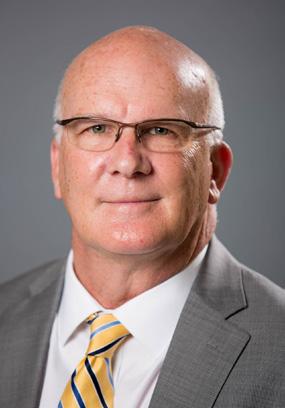

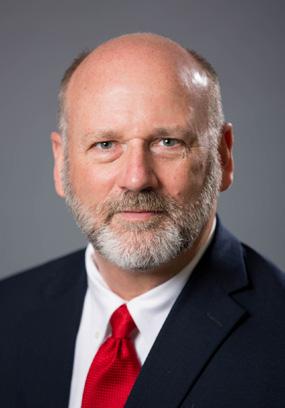
• Developed, organized, and implemented a plan for COVID-19 testing for all employees.
• Sourced and procured COVID-19 self-tests when availability was scarce during high demand to address changes in college policy.
• Created and distributed critical COVID-19 policy signage to provide clarity on campus protocols for the campus community.
• Held the College’s second annual virtual Diversity and Inclusion conference, G.U.I.D.E, that attracted over 1,000 participants and offered over thirty virtual sessions.
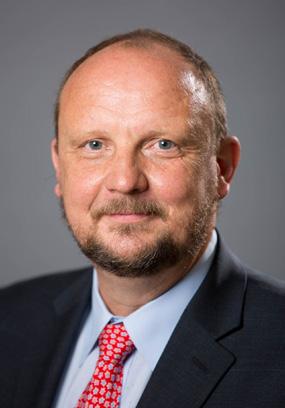
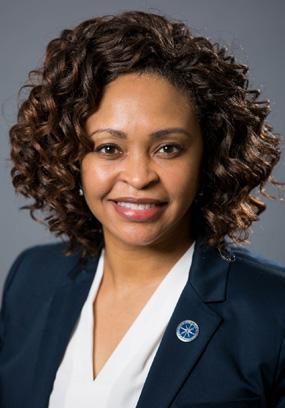
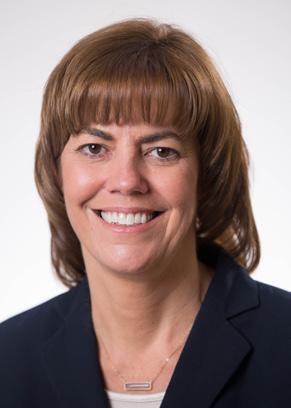
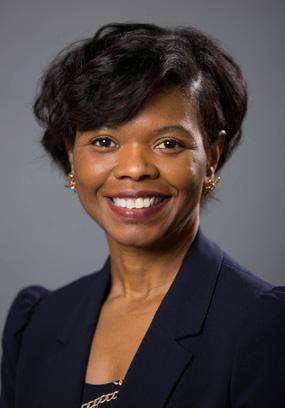
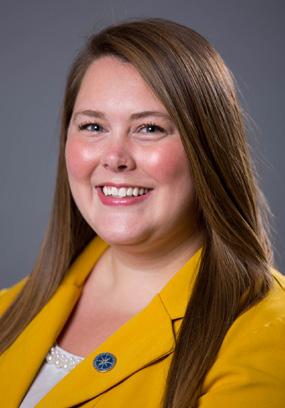
• Secured funding and completed the first phase of installation for the “Here’s My Story” inclusive public art initiative by placing three interactive benches in the community that focus on racial, cultural and ethnic diversity.
• Implemented a new-hire onboarding professional development package that incorporated COVID-19 safety, and diversity and inclusion training for all new employees.
• Implemented a broader strategy to for WorkBased Learning to include shorter internships, job shadowing, and job placement.
• Assisted and/or supported the recruitment of multiple employers to our region.
Student Tuition and Fees, Net Sales and Services, Net Nongovernmental Grants and Contracts
Other Operating Revenues
Total Revenues: $66,028,616
Funds appropriated by the State of North Carolina support most College operations. State tuition from all of the 58 community colleges is pooled at the state level and used to fund a portion of each college’s state budget allocations. Curriculum tuition rates are set by the North Carolina General Assembly. The College’s tuition rates did not increase and remain at $76 per credit hour for in-state tuition and $268 per credit hour for out-of-state tuition.
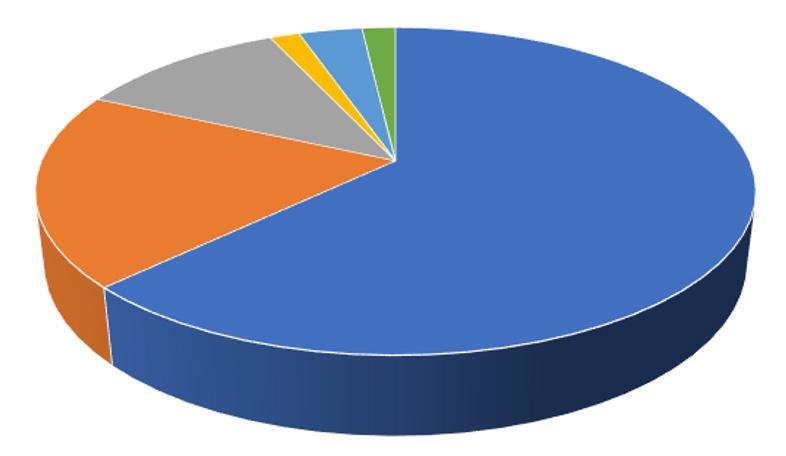

The College’s Financial Statements for the year ending June 30, 2021, report operating and non-operating revenues totaling $66,028,616. This includes state current aid of $34,297,750 and $3,491,987 for state capital aid. County current appropriations for the year totaled $7,676,021 while county capital aid was $1,309,213. The remaining revenue was from grants, sales and services receipts and student financial aid monies that are pass-through dollars
to the student. Additionally, the total revenue figure includes $3,888,530 in student tuition and fees, but it is important to note that state tuition monies are remitted to the state and not kept by the College. Total operating revenues for the fiscal year decreased by $992,919 over the prior year totaling $4,699,155. This decrease in revenue is primarily due to a decrease in enrollment with less students who in turn received less in student financial aid, which decreased net tuition receipts.
Net nonoperating revenue increased by $8,246,756 to $61,329,461 in fiscal year 2021. The increase is primarily due to noncapital contributions of $4,561,344, and an increase of $4,362,071 in federal aid – COVID-19. The noncapital contributions increased due to buildings and construction projects.
Total Expenditures: $61,550,758
Operating expenses for fiscal year 2021 increased $1,302,694 to $61,550,758. The change was primarily due to the increase in Scholarships and Fellowships of $2,098,642 and a decrease in salary and benefits $1,091,360, as well as decreases in pension and OPED expenses. Scholarships and fellowships increased primarily due to Coronavirus Aid, Relief, and Economic Security (HEERF) Act funding received for students. The College’s total net position at June 30, 2021 was $51,751,935, an increase of $10,333,190 over the prior fiscal year. The overall change in total net position is primarily attributable to an increase of $4,883,346 in Current Assets, $2,669,085 in Net Investment in Capital Assets, and a decrease of $3,023,498 in Long-Term Liabilities.
Cash and cash equivalents increased by $2,114,389 in fiscal 2021. Restricted cash and cash equivalents increased by $80,890. Current Receivables, net increased by $2,206,982 leading to an overall increase in total current assets 39.1% or $4,883,346.
In Fiscal 2021, the College helped 5,497 students receive financial aid totaling $13,481,369. The aid included $8,345,530 million in Pell grants which assisted approximately 2,444 students. The College also served and certified 164 veteran students who received $152,202.53 from the Department of Veteran Affairs.
Carl M. Short, Jr. | Chair
Cynthia L. Mynatt | Vice Chair
Carol S. Spalding, Ed.D. | President and Secretary to the Board
J. Thomas Bost
Paul A. Brown
Darise D. Caldwell, Ph.D.
Jeanne A. Dixon
William (Bill) Dusch
Patricia G. Fulcher
Patricia K. Horton
Lynn G. Marsh, Ph.D.
Wilmer Melton, III
Stephen M. Morris
Michelle Patterson
Dakeita Vanderburg
Jasmine Rosenberry | Student Government Association President
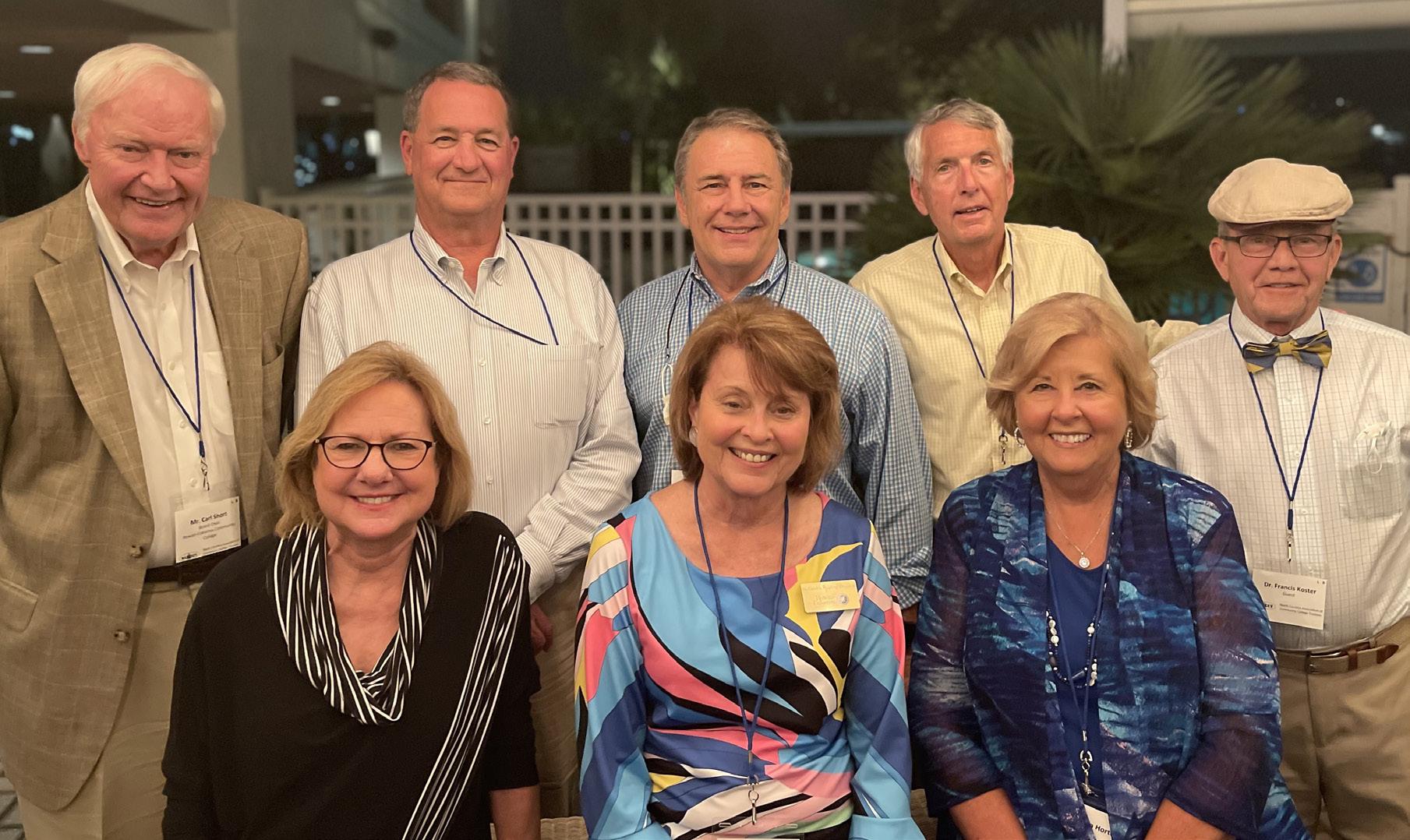
Brad Bost | Chair
William (Brian) Hiatt | Vice Chair
Kelly Kluttz | Treasurer
Carol Spalding, Ed.D. | Secretary
Karen Alexander
Cordelia Andrews
Marjorie Benbow
Paige Crowe
Jeanne Dixon
Michael Fischer
Dianne Greene
Barbi Jones
Barbara Mallett
Matt Millward
Robin Moore
Smita Quinn
P.J. Ricks
Mark Spitzer
Elaine Spalding
Rowan-Cabarrus Community College improves lives and builds community through public higher education and workforce development.
Rowan-Cabarrus Community College is an open-door, comprehensive learning-centered institution of higher education serving the citizens of Rowan and Cabarrus counties. The College, a member of the North Carolina Community College System, offers affordable occupational and education programs leading to Associate in Arts Degree, Associate in Science Degree, Associate in Fine Arts Degree, Associate in General Education Degree, and Associate in Applied Science Degrees. Diplomas and certificates are awarded for other occupational, adult and continuing education programs. The primary focus of the College’s offerings is on workforce development by meeting the educational needs of the individual and meeting the changing training requirements of business and industrial firms as well as other employers in the service area.
Reflecting its commitment to student learning outcomes, the College strives to inspire its students to increase their knowledge, develop occupational and technical proficiencies, respond to lifelong learning opportunities, and increase their awareness as responsible citizens in a democratic society.
Vision: Building sustainable futures through the power of learning.
• Excellence and innovation in education and workforce training;
• Continuous improvement through lifelong learning and achievement;
• Trust, integrity, inclusiveness, and mutual respect;
• Exemplary service through team work;
• Responsibility, sustainability, accountability;
• Leadership, partnership and global citizenship.


